“No happiness or pain, no more forgetting”
― Gabriela Mistral
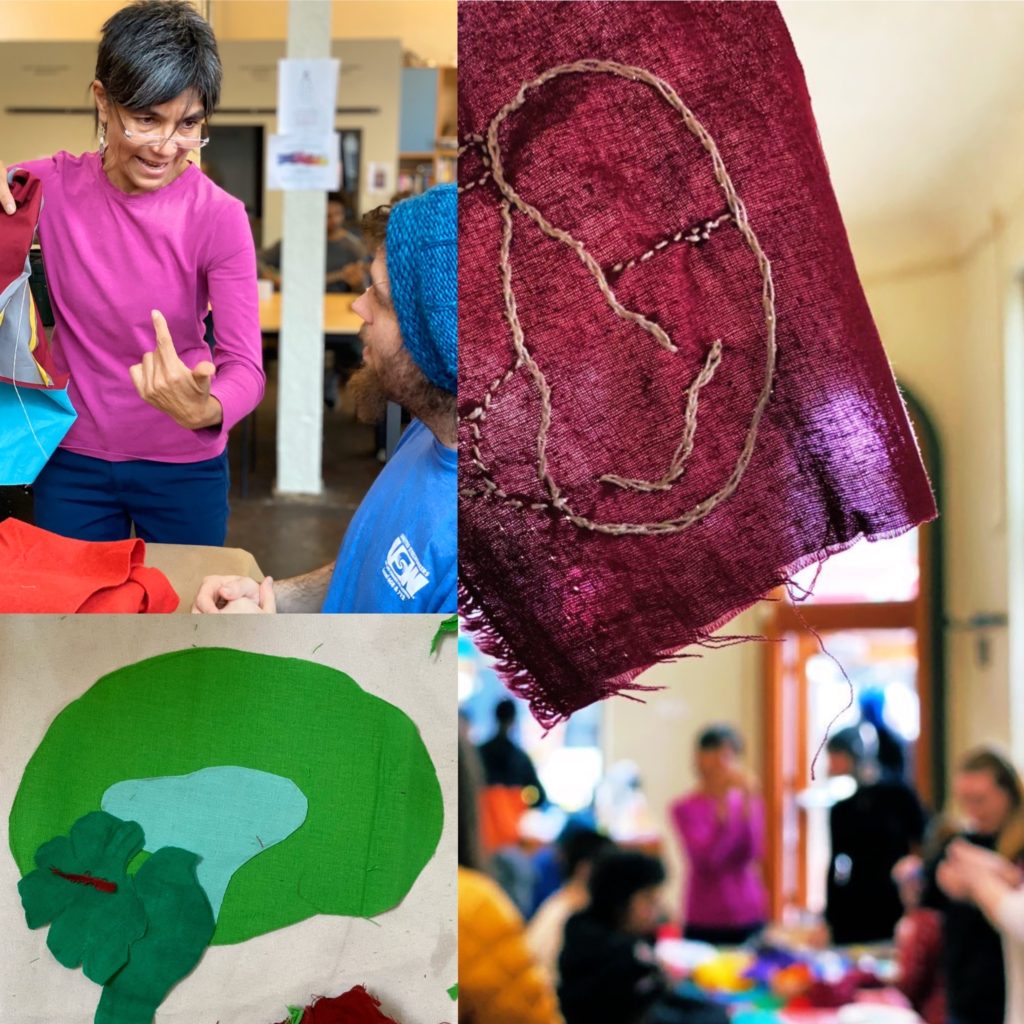
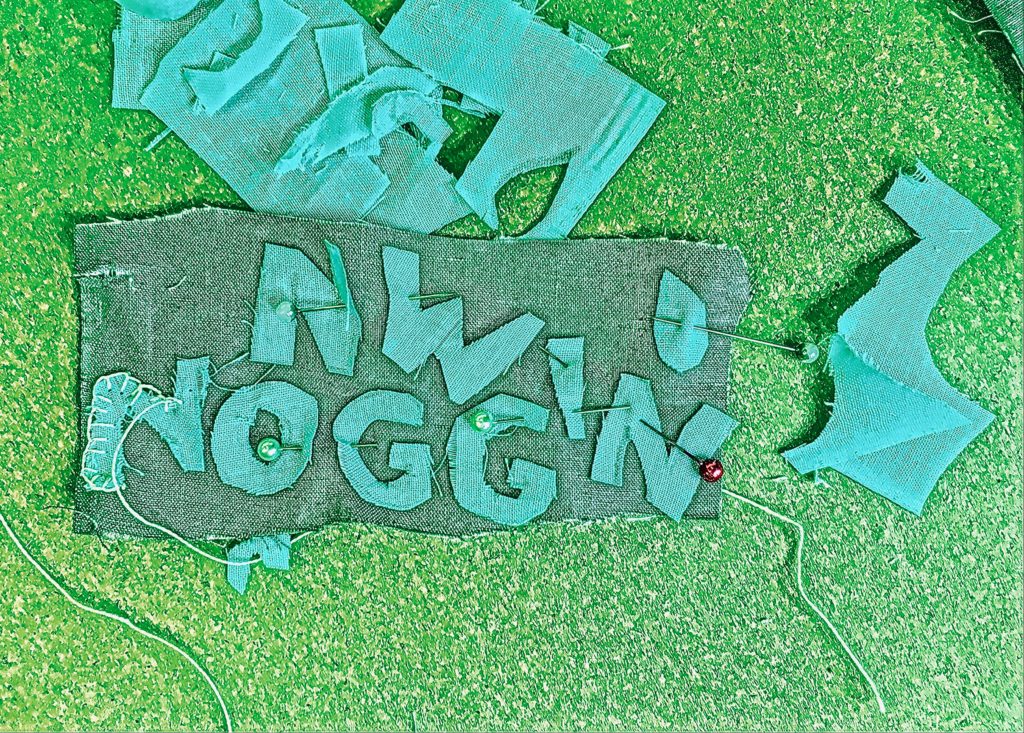
Watch our video poster abstract for the Society for Neuroscience Oregon/SW WA Chapter meeting 2021
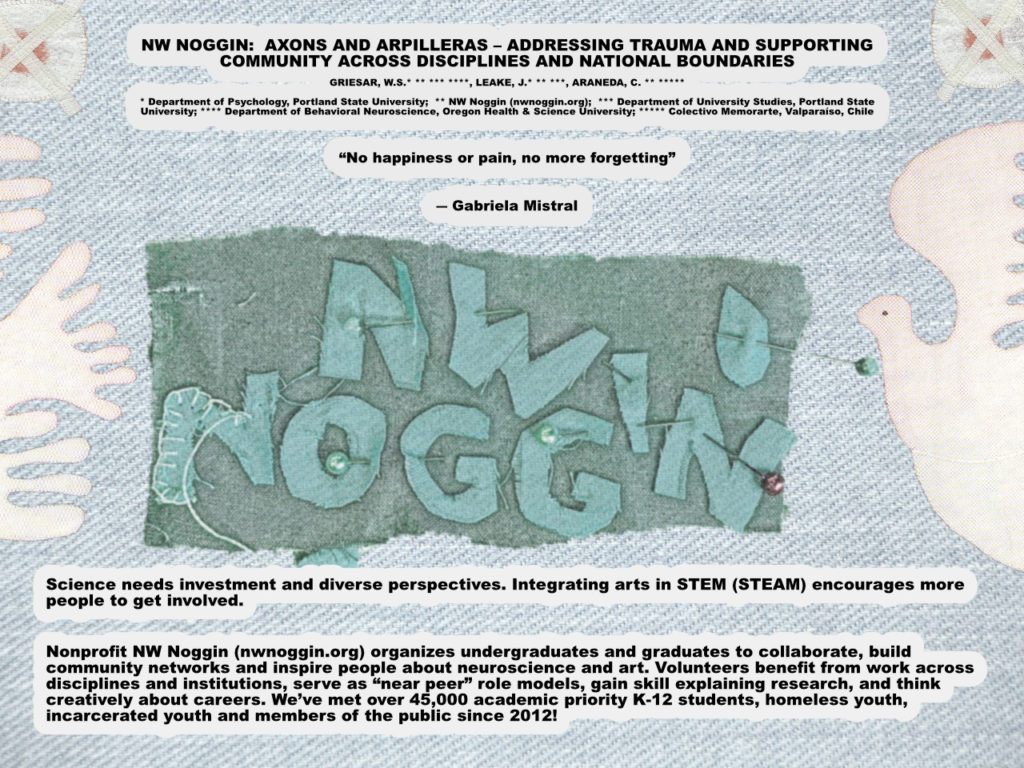
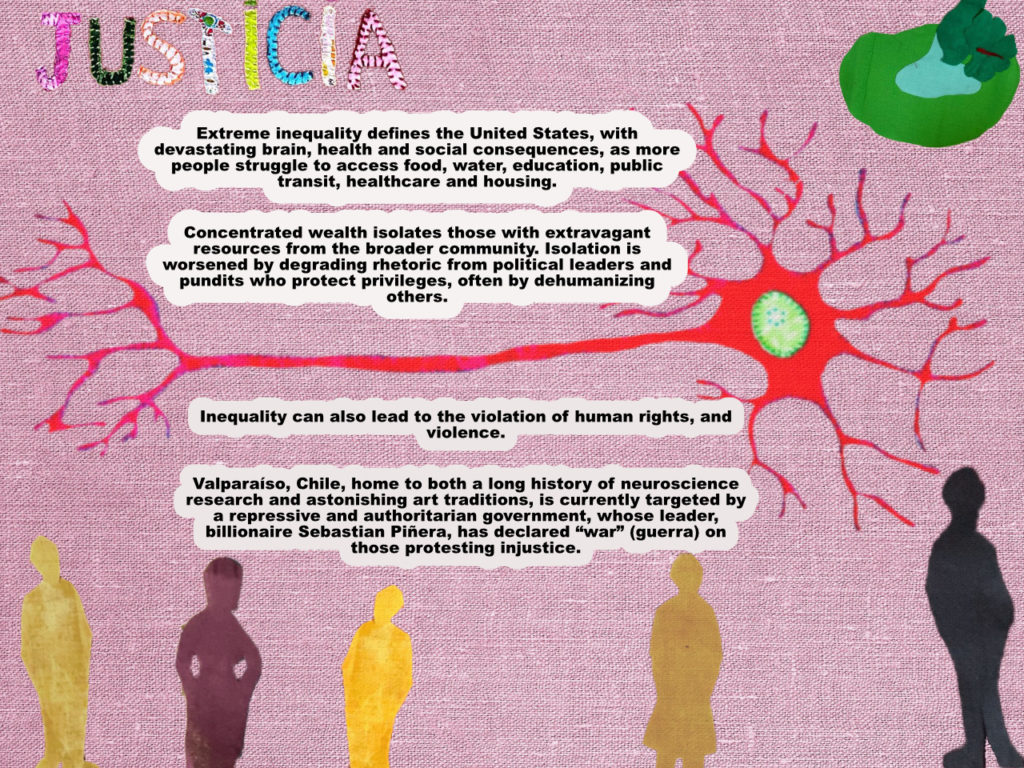
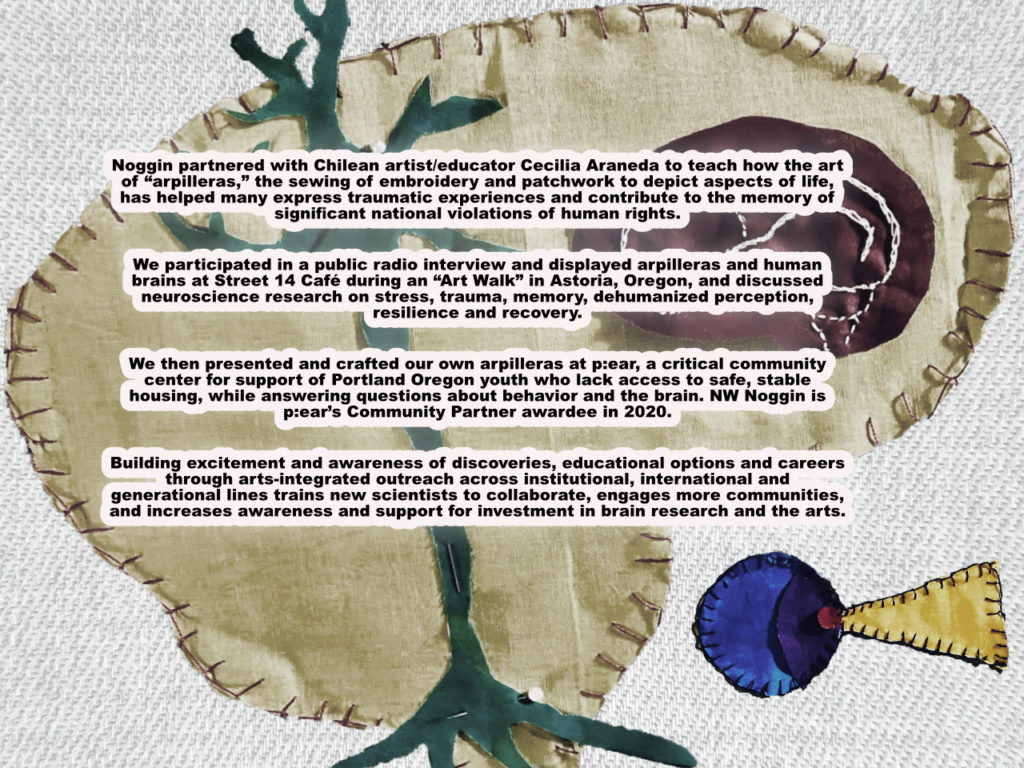
LEARN MORE: Society for Neuroscience Oregon / SWWA Annual Meeting
Inequality harms us all
Inequality currently defines the United States and many other countries, including the narrow Latin American nation of Chile.
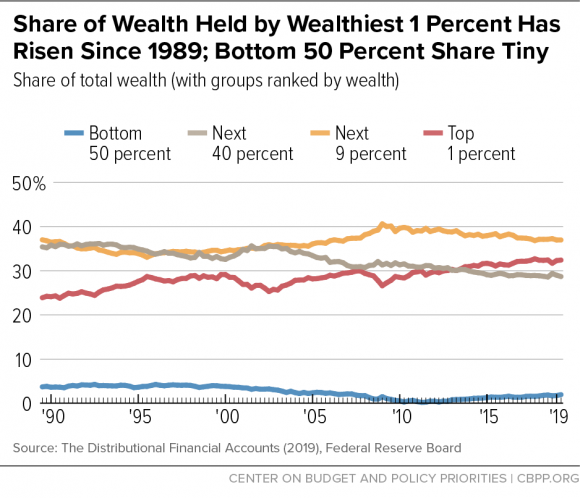
LEARN MORE: A Guide to Statistics on Historical Trends in Income Inequality
LEARN MORE: The 20 Richest People in America 2020
LEARN MORE: Wealth concentration returning to ‘levels last seen during the Roaring Twenties,’ according to new research
LEARN MORE: World’s witnessing a new Gilded Age as billionaires’ wealth swells to $6tn
LEARN MORE: U.S. billionaires paid a lower tax rate than the working class last year (2018)
LEARN MORE: Inequality in nature and society
LEARN MORE: Explainer: Chile’s inequality challenge: What went wrong and can it be fixed?
LEARN MORE: Pinochet Still Looms Large in Chilean Politics
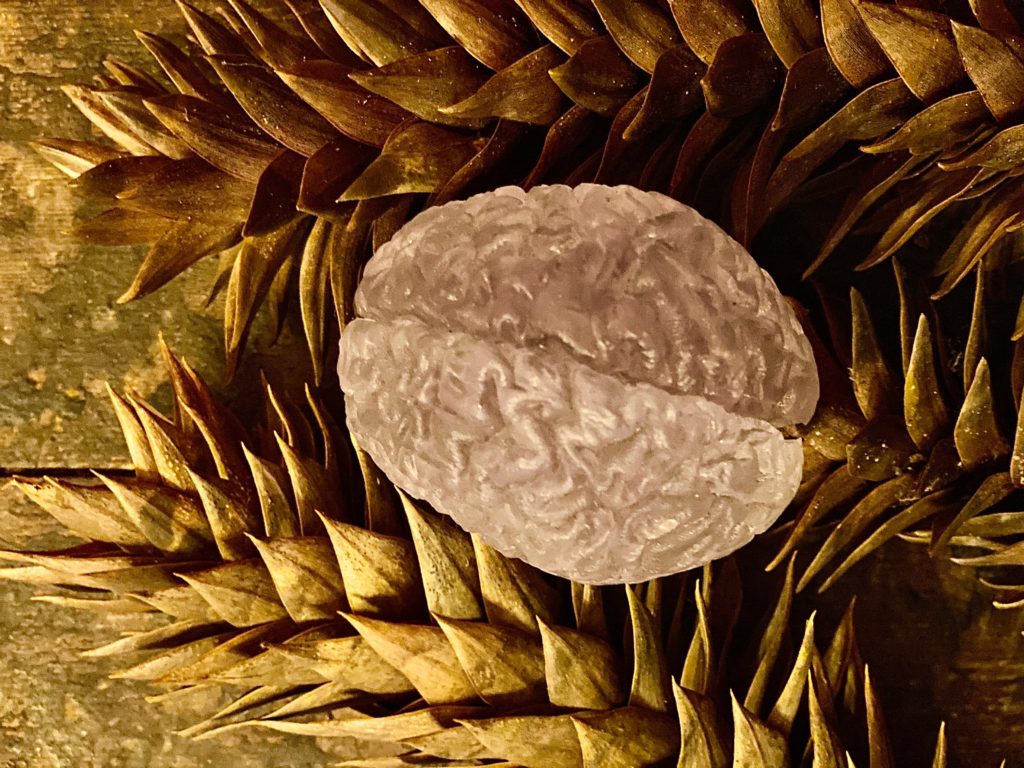
Inequality also impacts our health, and our brains.
LEARN MORE: Income levels affect the structure of a child’s brain, NIH-funded study shows
LEARN MORE: Rich Man, Poor Man: Socioeconomic Adversity and Brain Development
LEARN MORE: Brain on stress: How the social environment gets under the skin
LEARN MORE: The effects of community income inequality on health
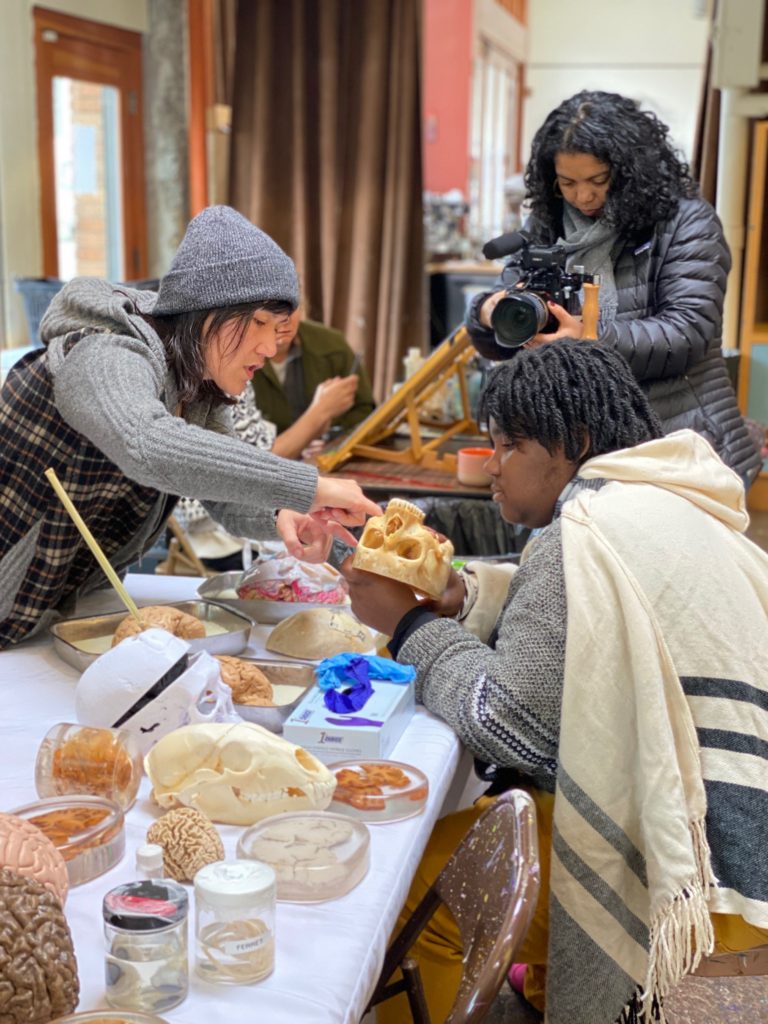
LEARN MORE: Noggin @ p:ear
Extreme inequality has devastating social consequences, as more of us struggle with safe access to affordable food, water, education, public transit, healthcare and housing, while many at the top (Jeff Bezos, Mark Zuckerberg, Bill Gates, …) become insulated and disconnected and often stop seeing, or meaningfully engaging with the majority of their fellow citizens.

Concentrated wealth isolates those with extravagant resources from the broader community – in private schools and colleges, gated neighborhoods, paywalled entertainment and corporate boards. This isolation is made worse by degrading rhetoric from political leaders and pundits who serve to protect their privileges, often by denigrating and dehumanizing others.
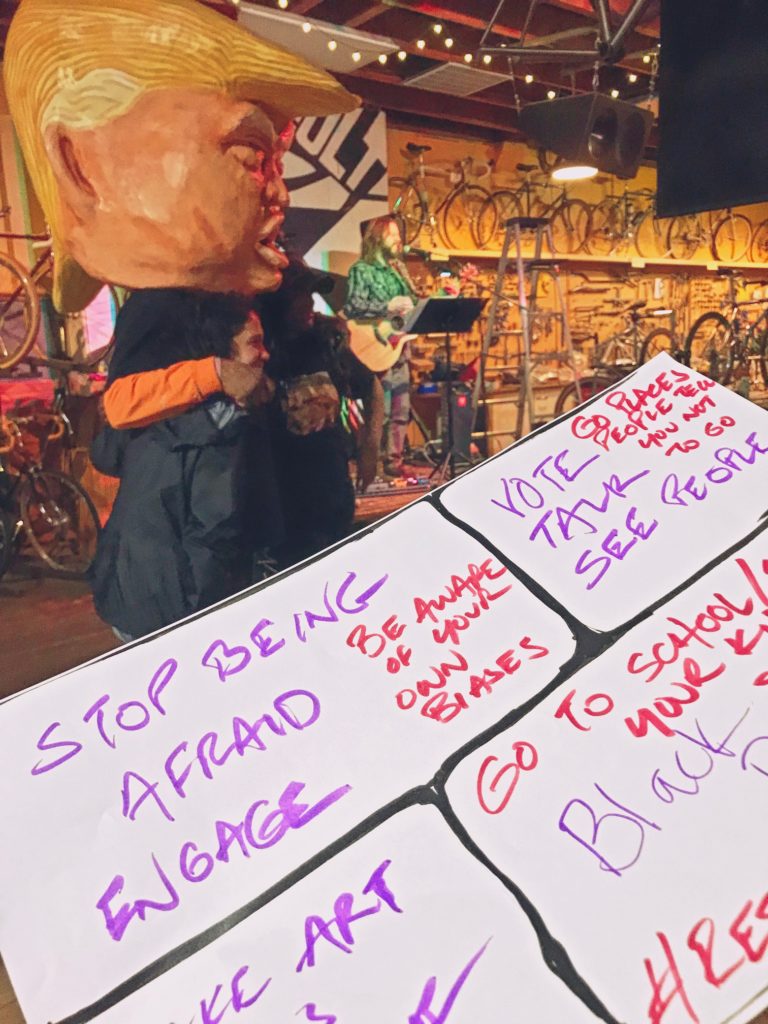
“These aren’t people. These are animals, and we’re taking them out of the country at a rate that’s never happened before.”
― Donald Trump, current U.S. President
LEARN MORE: Race, Bias & Brain: You Can’t Control Art
LEARN MORE: Landscapes of the Brain: Seeing us all through research & art
LEARN MORE: Being there means something
LEARN MORE: There’s a dark political history to language that strips people of their dignity
LEARN MORE: Dehumanizing Metaphors Lead to Dehumanizing Policies
LEARN MORE: White Nationalism Is a Republican Crisis
LEARN MORE: The Culture of Affluence: Psychological Costs of Material Wealth
LEARN MORE: Bill Gates’s Fortune Isn’t Going Anywhere
“The evidence shows that big donors, collectively, acted to leverage their clout to help push through the tax cut law that would enrich the kinds of corporations, limited partnerships, real estate holdings and huge investments that many of them own…”
― LEARN MORE: Did Billionaires pay off Republicans for passing the Trump Tax Bill?
Inequality can also lead to the violation of human rights, and violence.
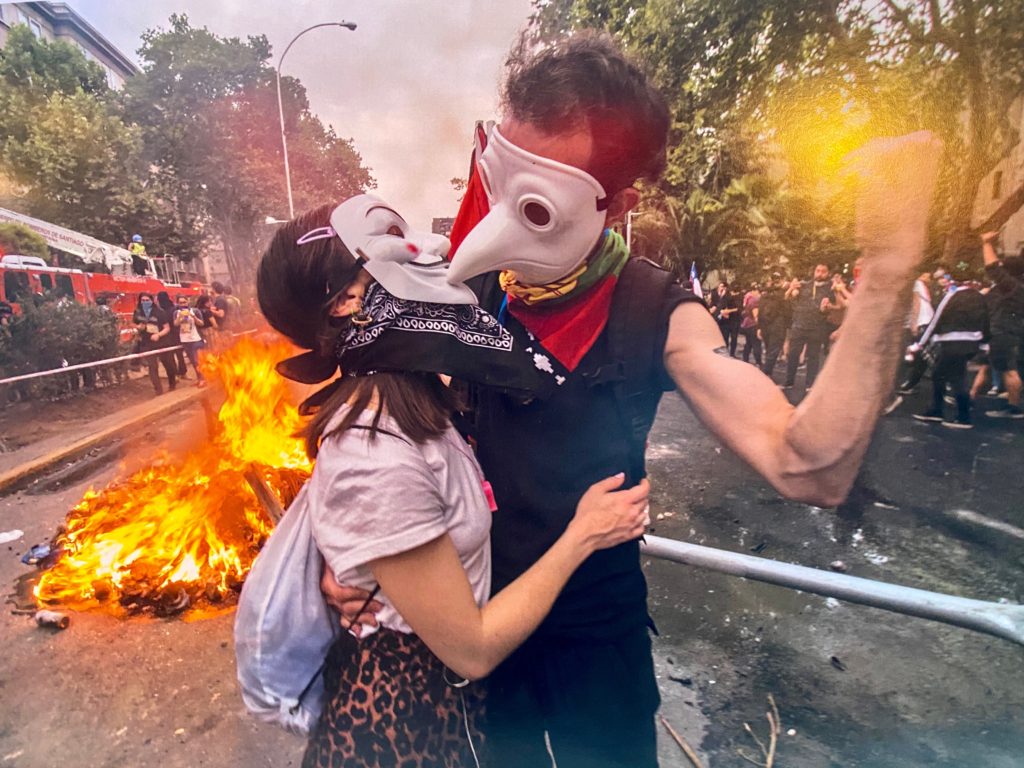
Valparaíso, Chile, home to both an extraordinary tradition of neuroscience research and astonishing street art, is currently targeted by a repressive and authoritarian government, whose leader, the billionaire Sebastian Piñera, has declared “war” (guerra) on those protesting systemic injustice.
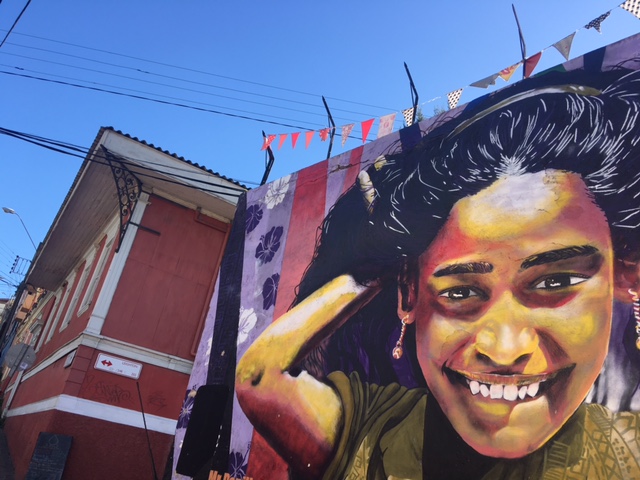
“I sing for a far strip of country
― Victor Jara
narrow but endlessly deep.“
LEARN MORE: La Alegría de la Ciencia
LEARN MORE: Latino Network Learning & Lobes
LEARN MORE: The ‘risk to democracy’ in Chile isn’t from protesters. It’s from Piñera and the 1%
LEARN MORE: Amid unrest and rights abuses, Chile protesters say ‘there’s no turning back’
LEARN MORE: Chile’s People Have Had Enough
LEARN MORE: Trump’s Zero-tolerance Policy: Would a Political Response to a Humanitarian Crisis Work?
This month Noggin was thrilled to partner with artist and educator Cecilia Araneda from Valparaíso and discover how the art of “arpilleras,” the sewing of embroidery and patchwork to depict aspects of everyday life, has helped many express personal traumatic experiences and contribute to the memory of significant national violations of human rights.
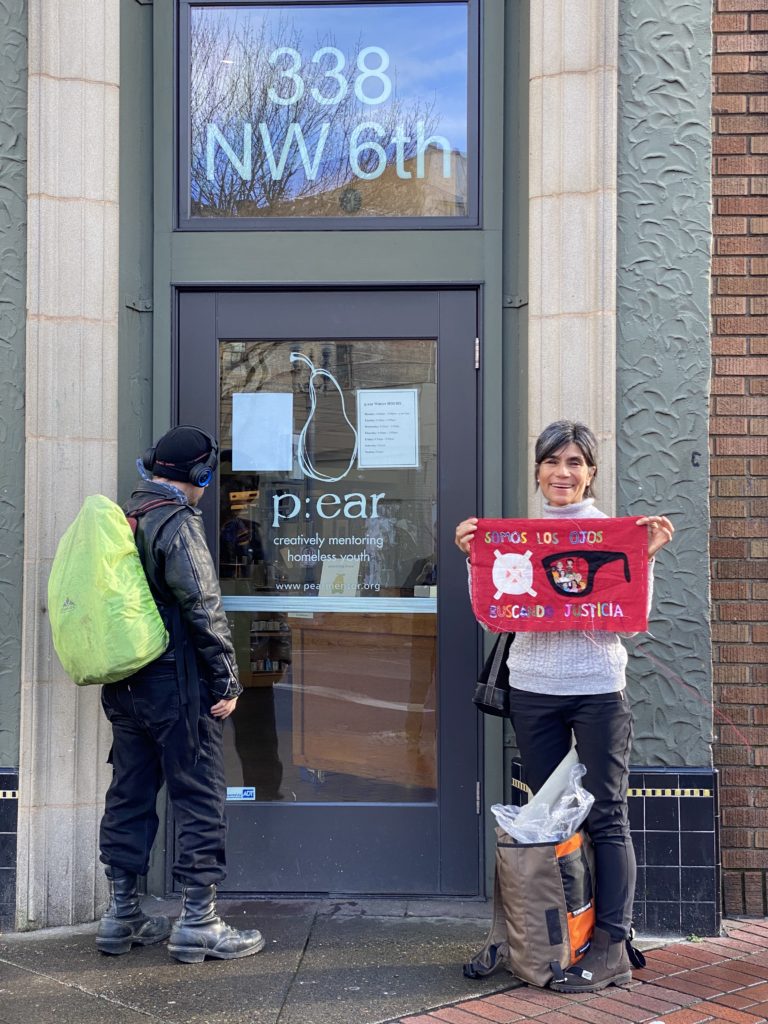
LEARN MORE: What is an Arpillera?
LEARN MORE: Chilean Embroiderers Record Memory Stitch-by-Stitch
LEARN MORE: Chilean Women’s Resistance in the Arpillera Movement
LEARN MORE: Arpilleras rebeldes: otra forma de arte y lucha popular
LEARN MORE: The Colorful Quilt Squares Chilean Women Used to Tell the Story of Life Under Pinochet
LEARN MORE: The Connection Between Art, Healing, and Public Health: A Review of Current Literature
LEARN MORE: Effectiveness of Art Therapy With Adult Clients in 2018—What Progress Has Been Made?
“Those who cannot remember the past are condemned to repeat it.”
― George Santayana
Arpilleras in Astoria
It was our pleasure to share these arresting artworks – along with brains and neuroscience research related to trauma and recovery – with visitors to Street 14 Cafe in Astoria, Oregon!
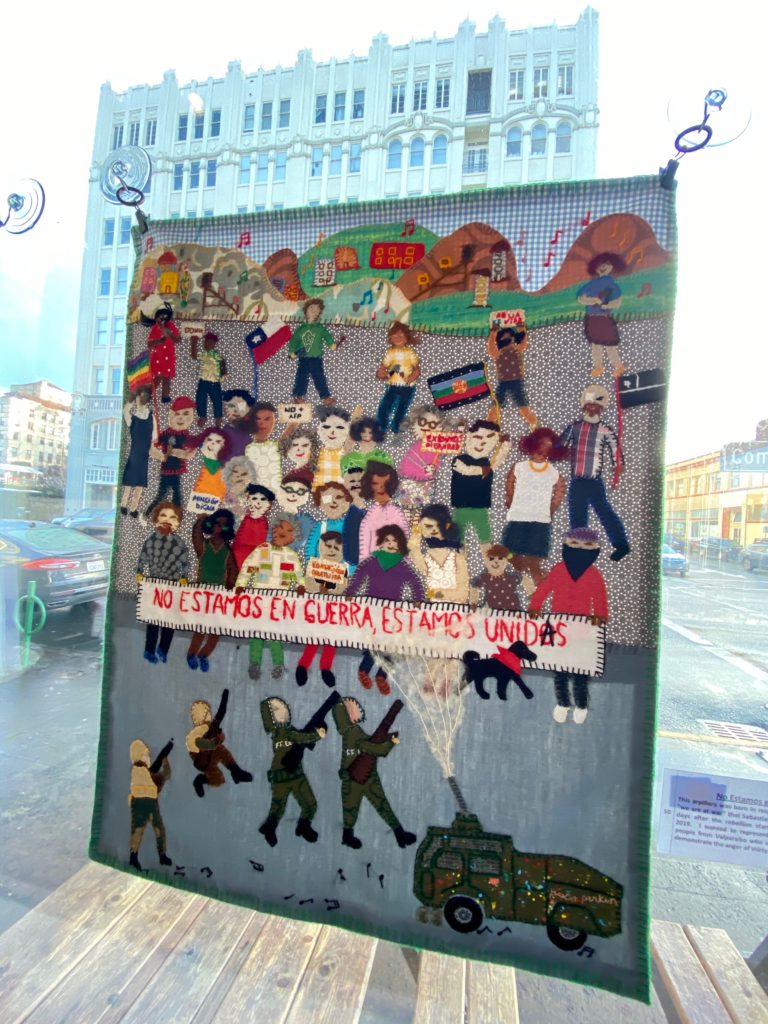
“The title of my arpillera is due to a sentence that Piñera said the second or third day of this rebelión. He said ‘We are at war against a bunch of violent people,’ so people said ‘We are not at war, we are united.’”
― Cecilia Araneda
KMUN Interview
We enjoyed an interview with “ARTS – Live & Local!” host Cindy Price on 91.9 FM (KMUN), Oregon’s North Coast public broadcasting station, before meeting visitors to Astoria’s Second Saturday Art Walk fascinated by the compelling, hand-stitched arpilleras and the powerful, memorable experiences of inequality, torture and resistance they depict.
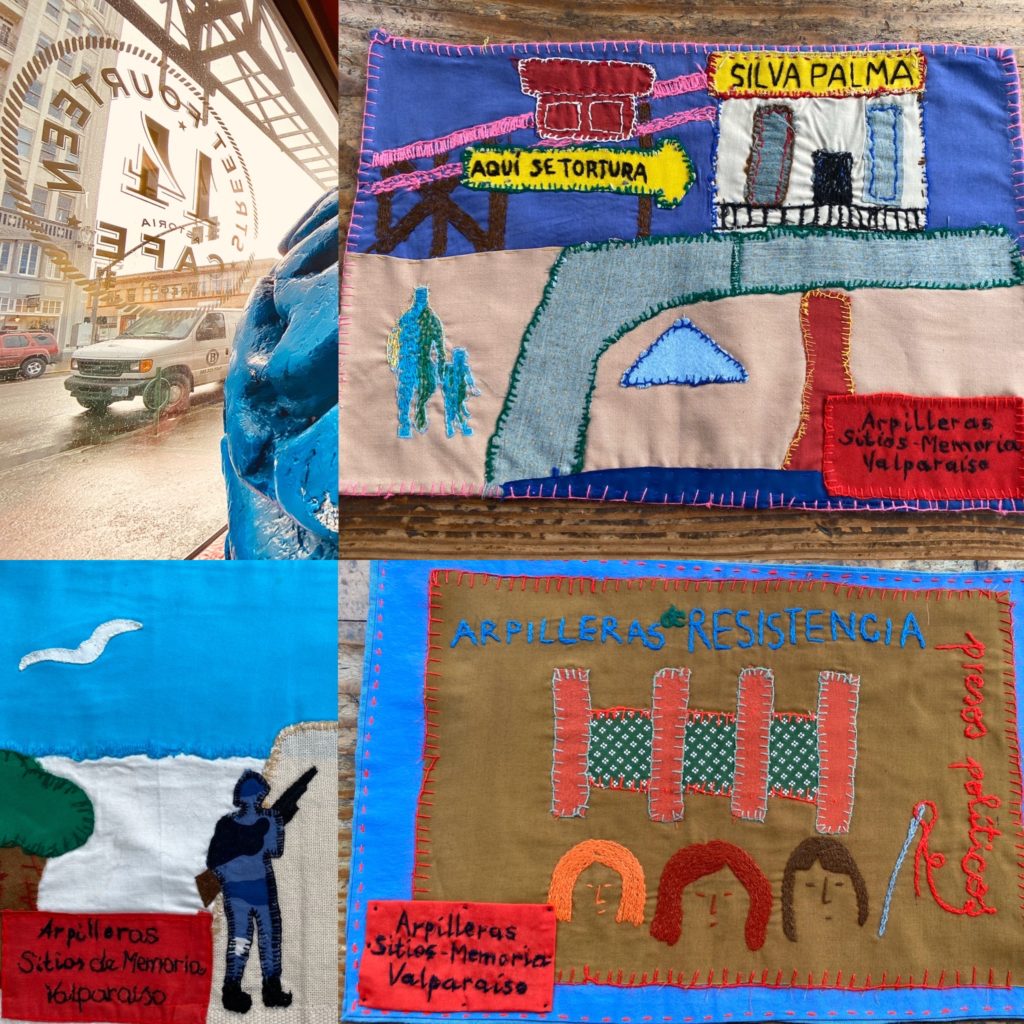
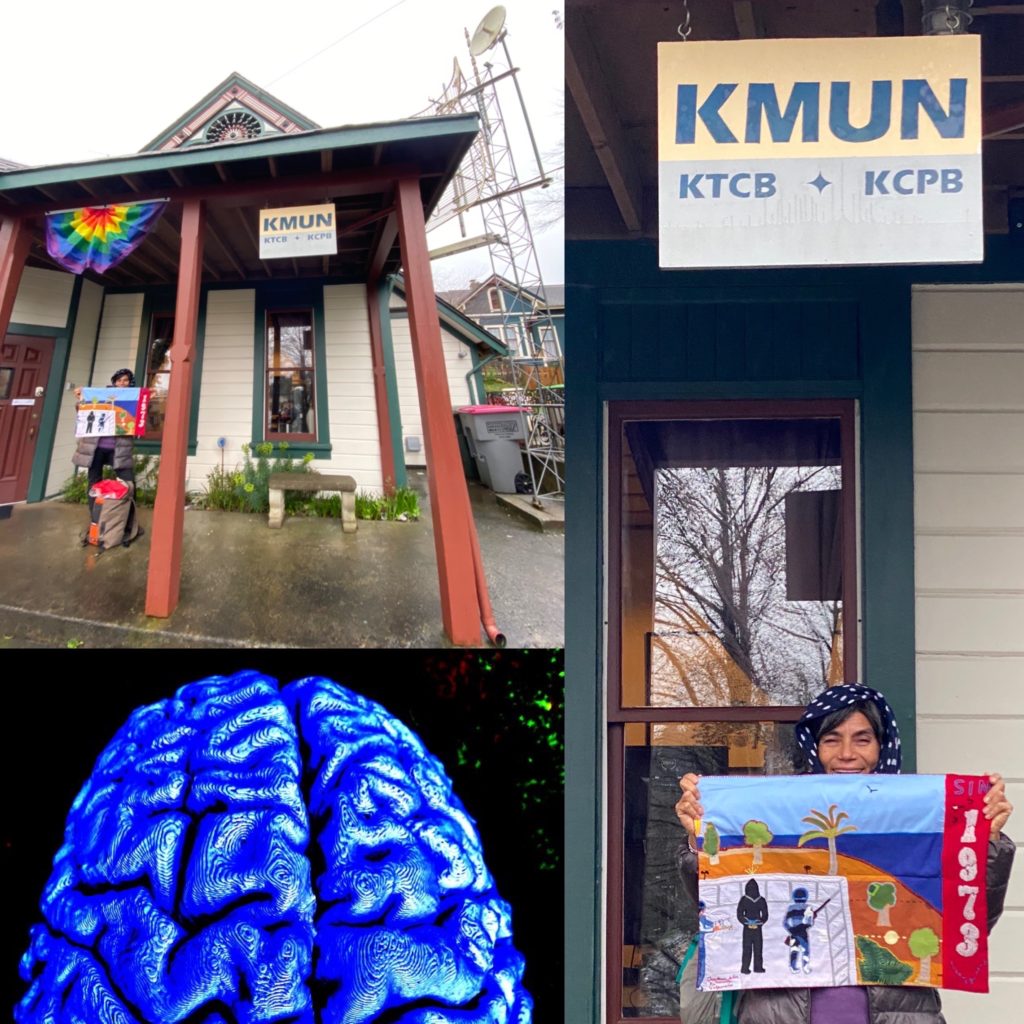
The U.S. government contributed substantially to the instability, inequality and repression in Chile during the Pinochet era.
“Make the economy scream” in Chile…
― Richard M. Nixon, former U.S. President; LEARN MORE: Chile and the United States
LISTEN
Interview begins at ~41 minutes…
Friday, Feb 7th at 3 pm, ARTS – Live & Local! With Guest Host Cindy Price
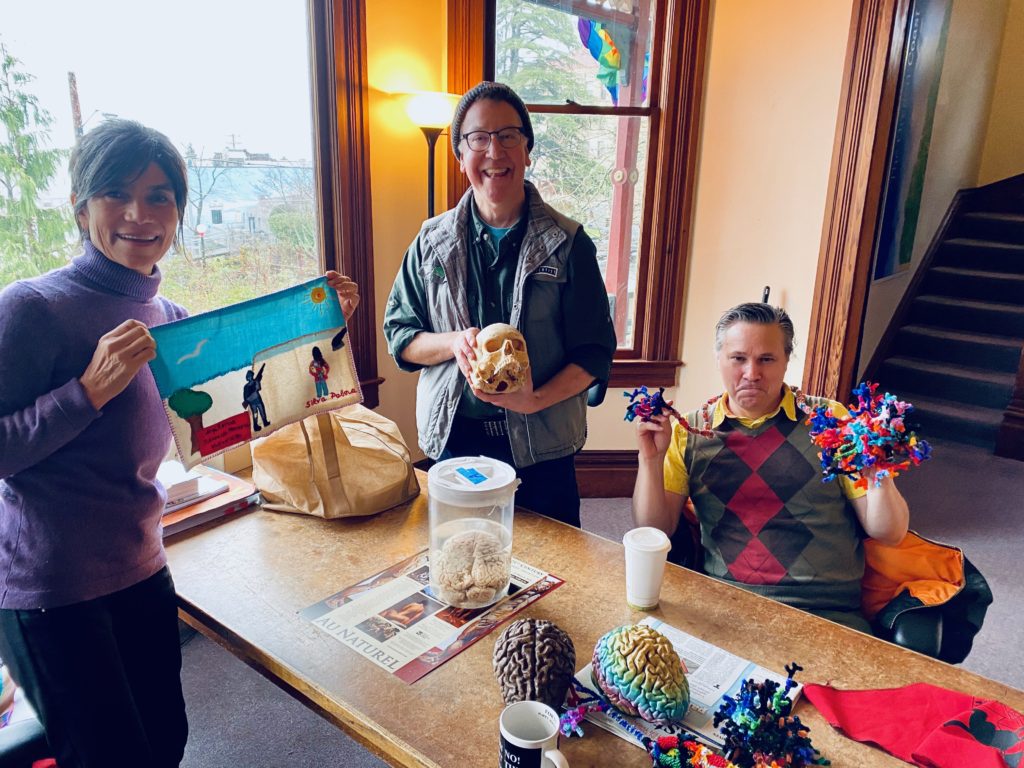
Art Walk @ Street 14
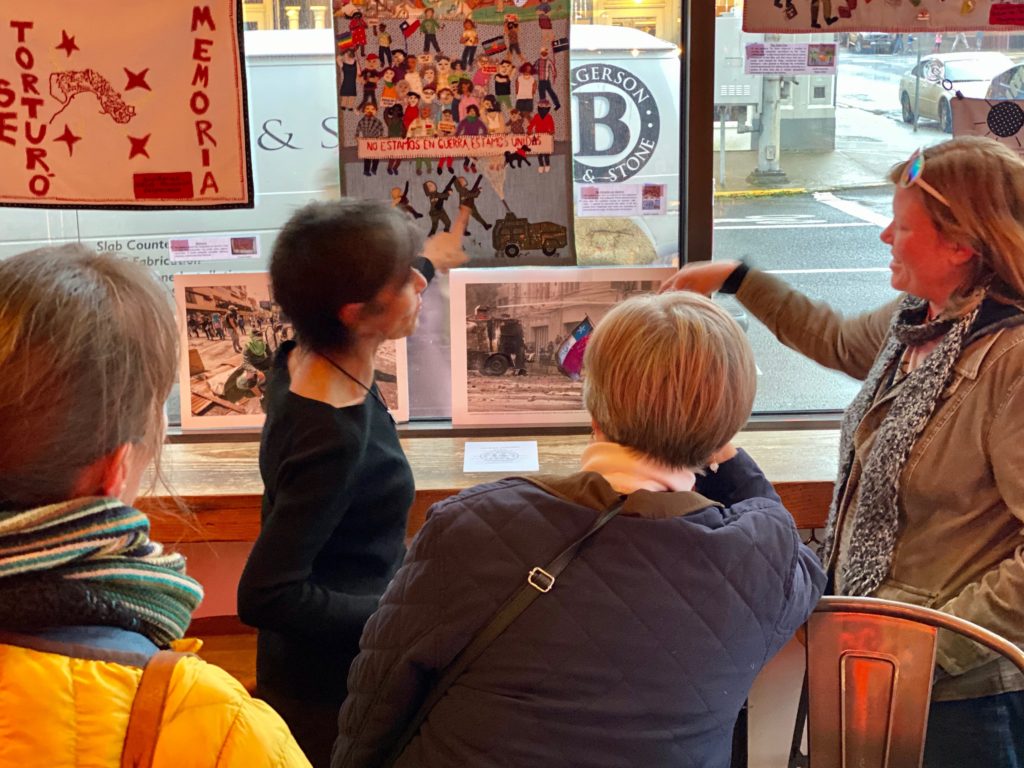
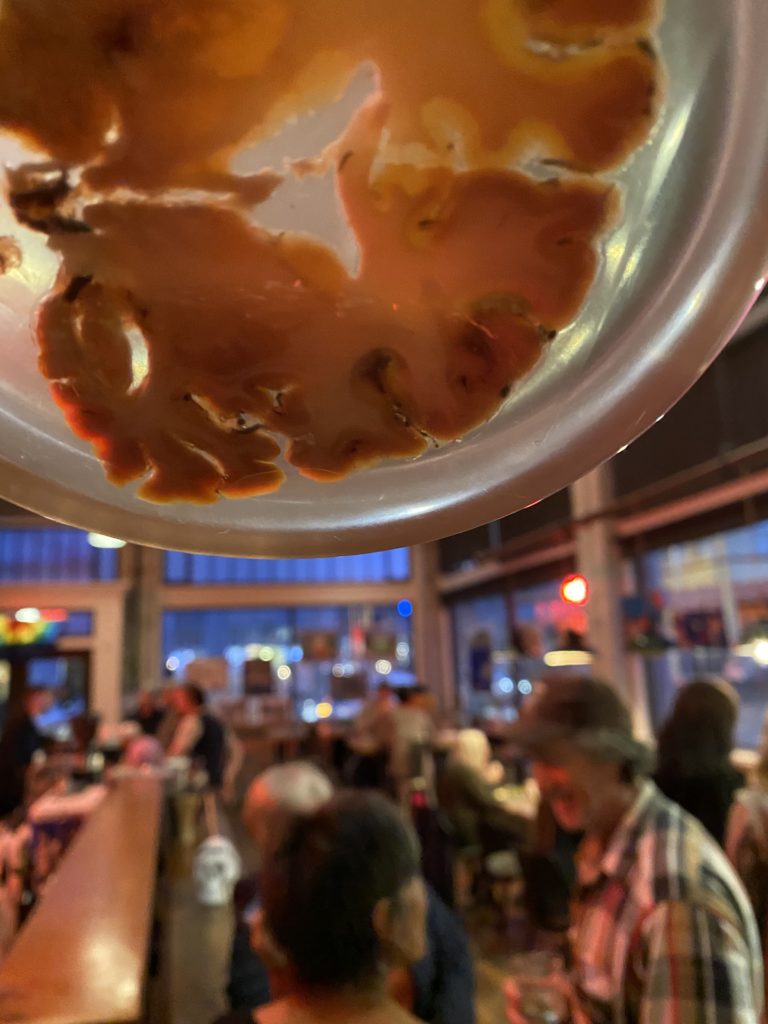
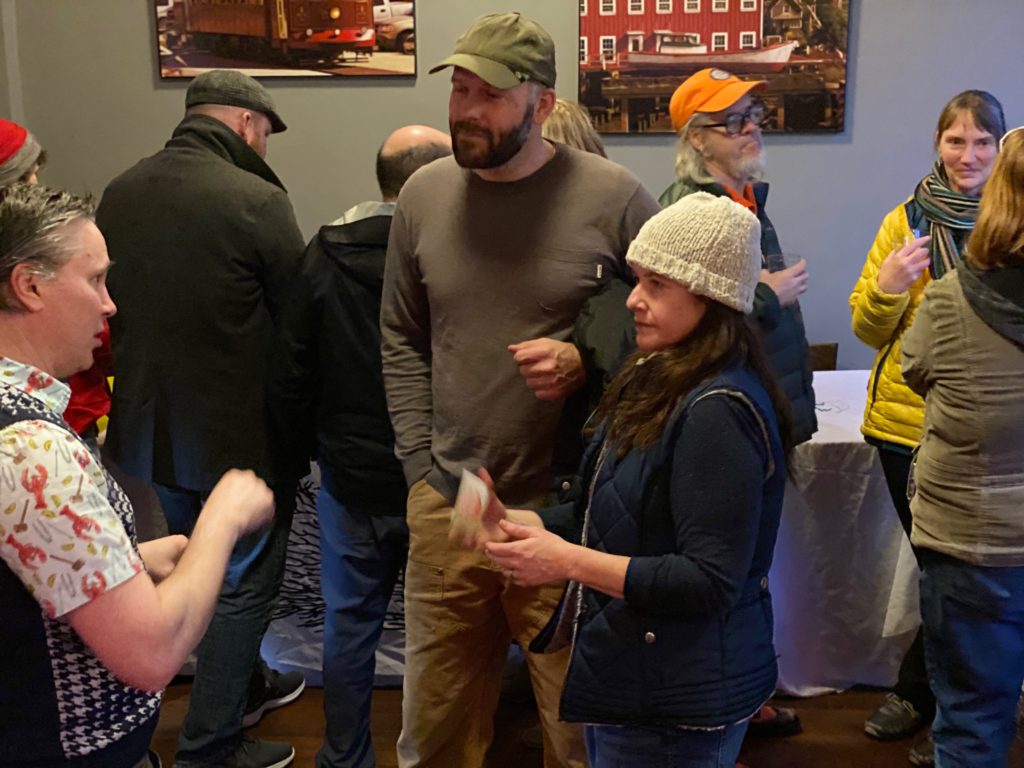
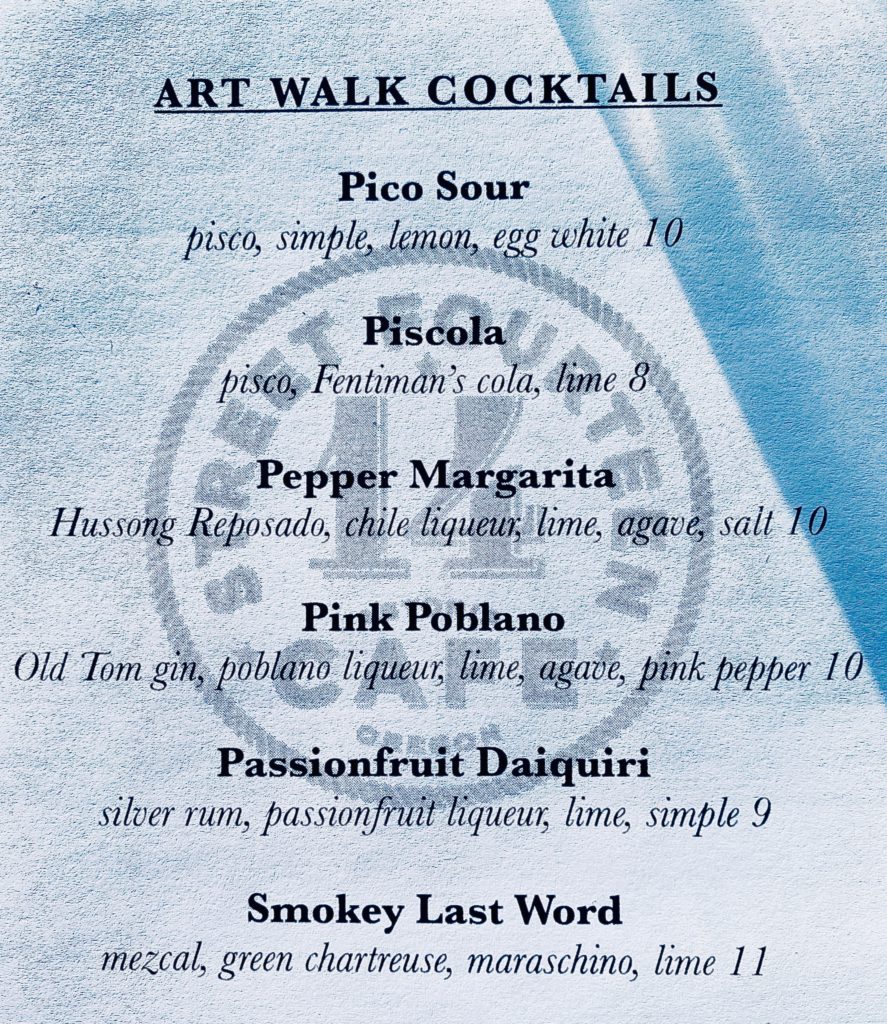
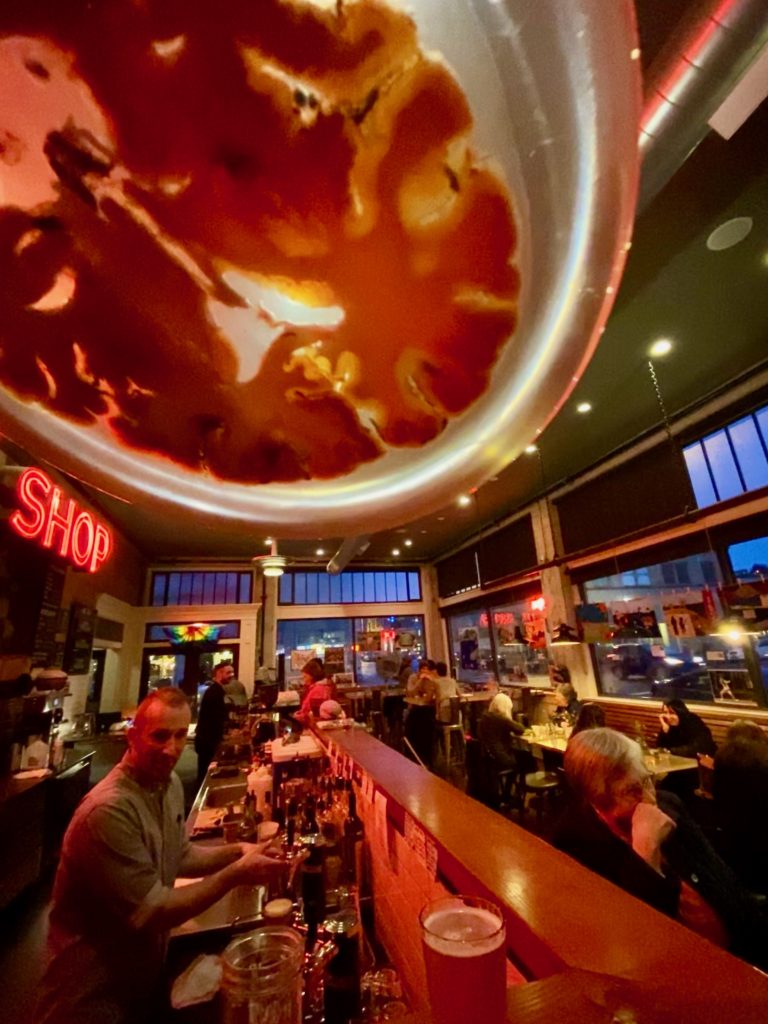
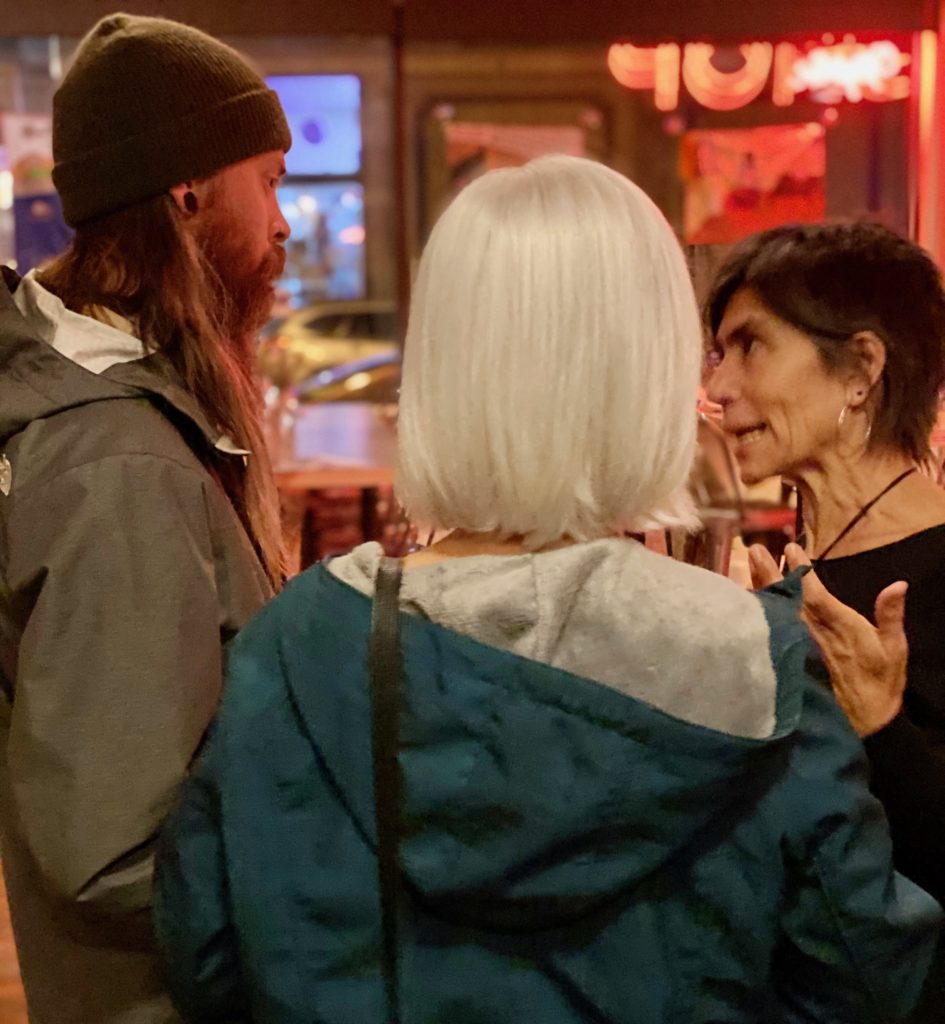
The arpilleras remained up at Street 14 through Sunday afternoon (2/9)…
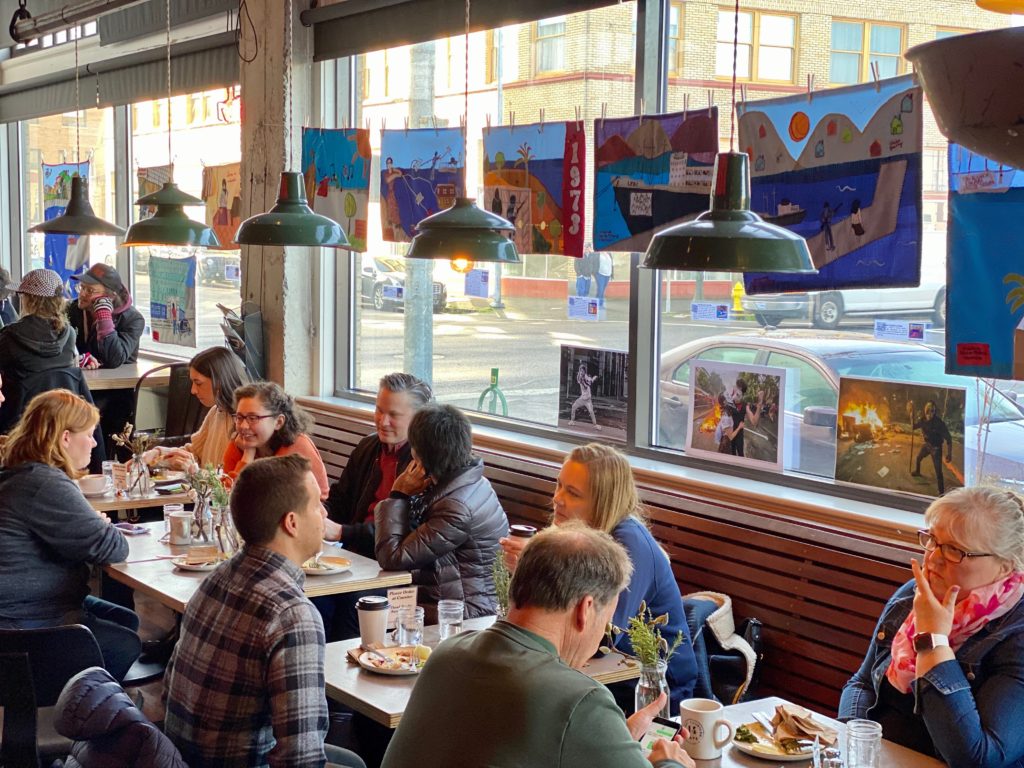
Arpilleras @ p:ear
Cecilia then brought her artwork and art skills to p:ear, a critical community center for support of Portland’s youth who lack access to safe or stable housing.
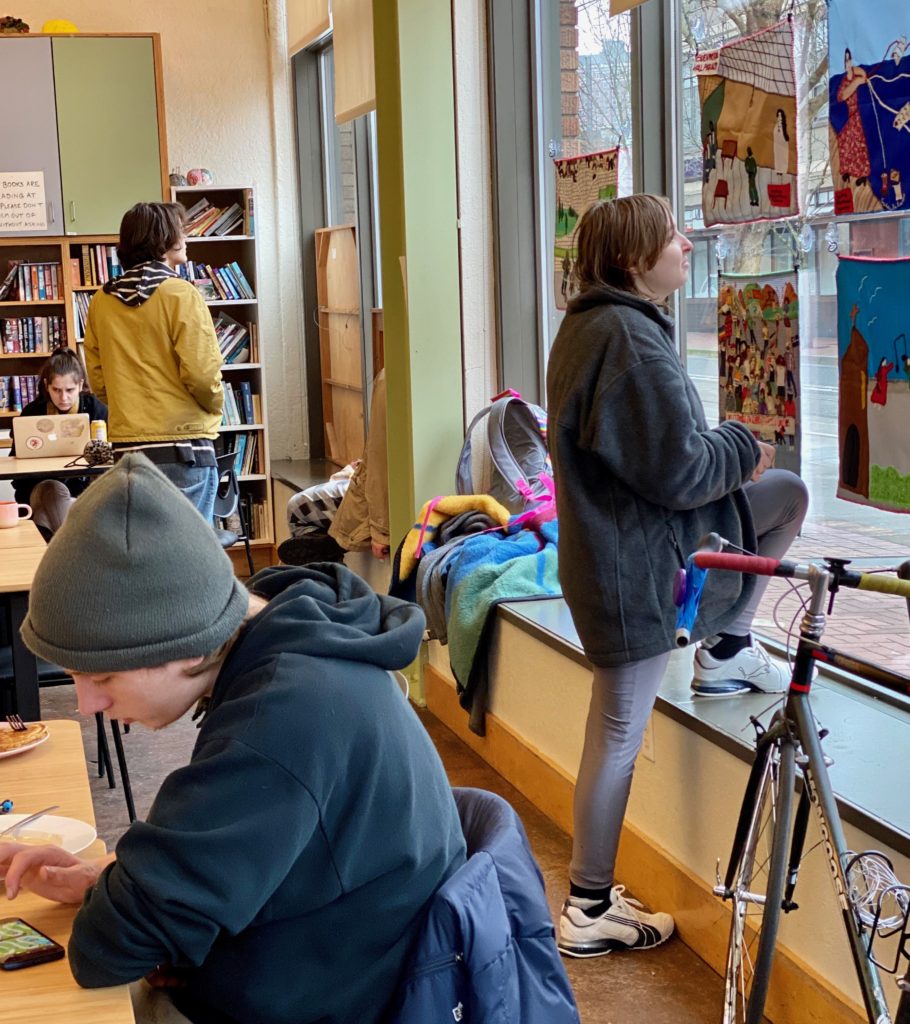
LEARN MORE: Noggin is the 2020 Community Partner for p:ear!
Will Kendall, p:ear’s Art Director, prepared colorful fabric, scissors and thread for sewing arpilleras of our own.
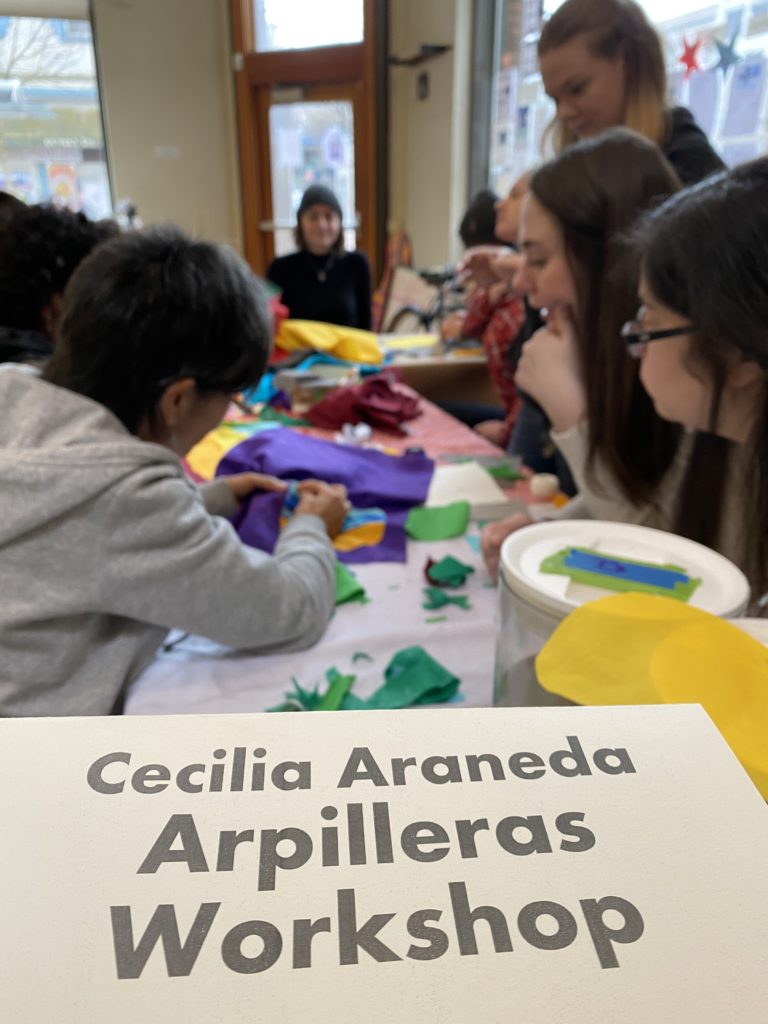
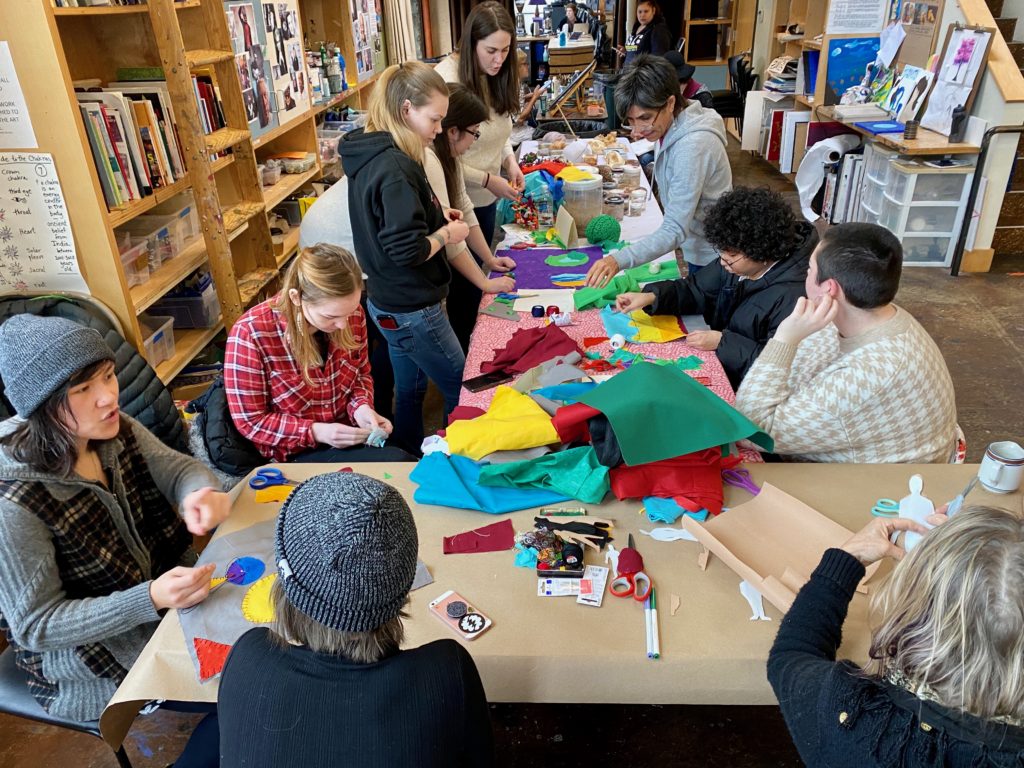
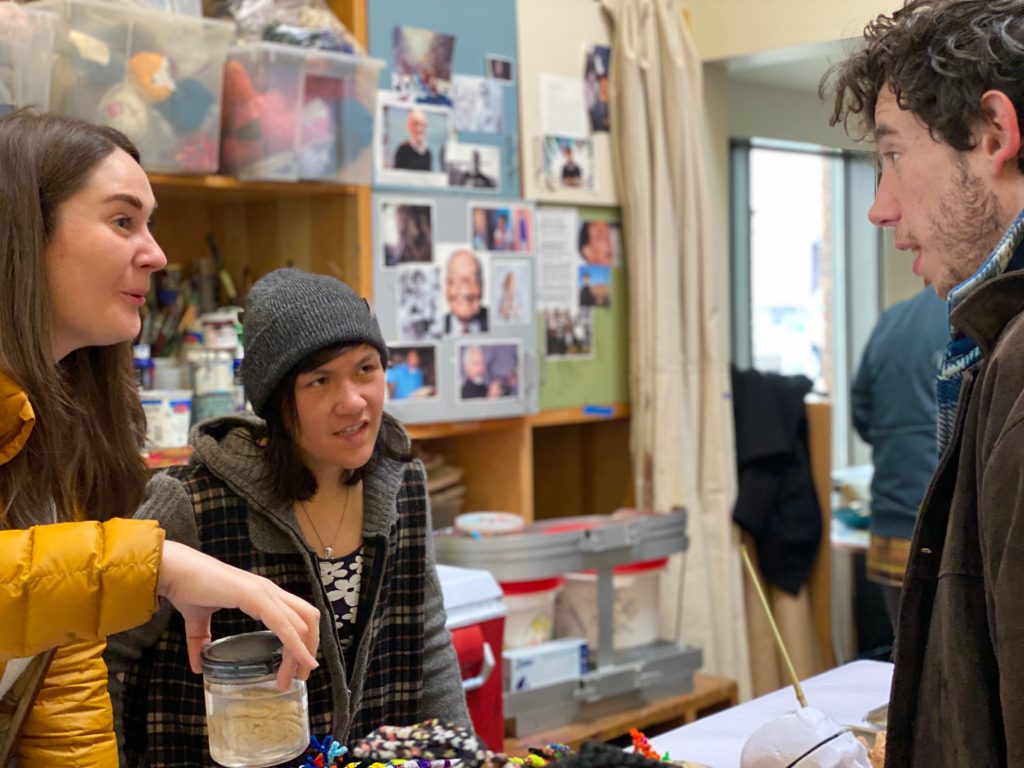
Noggineers Beth Woodward, Sydney Duran, Nick Burdick Levin, Yaritsa Velasco, Greyson Moore, Sorrel Johnson, Abigayle Moon, Cassandra James, Chloe Voshell, and Maria Galvan-Bravo joined us from Portland State University, as did Dr. Anita Randolph from OHSU.
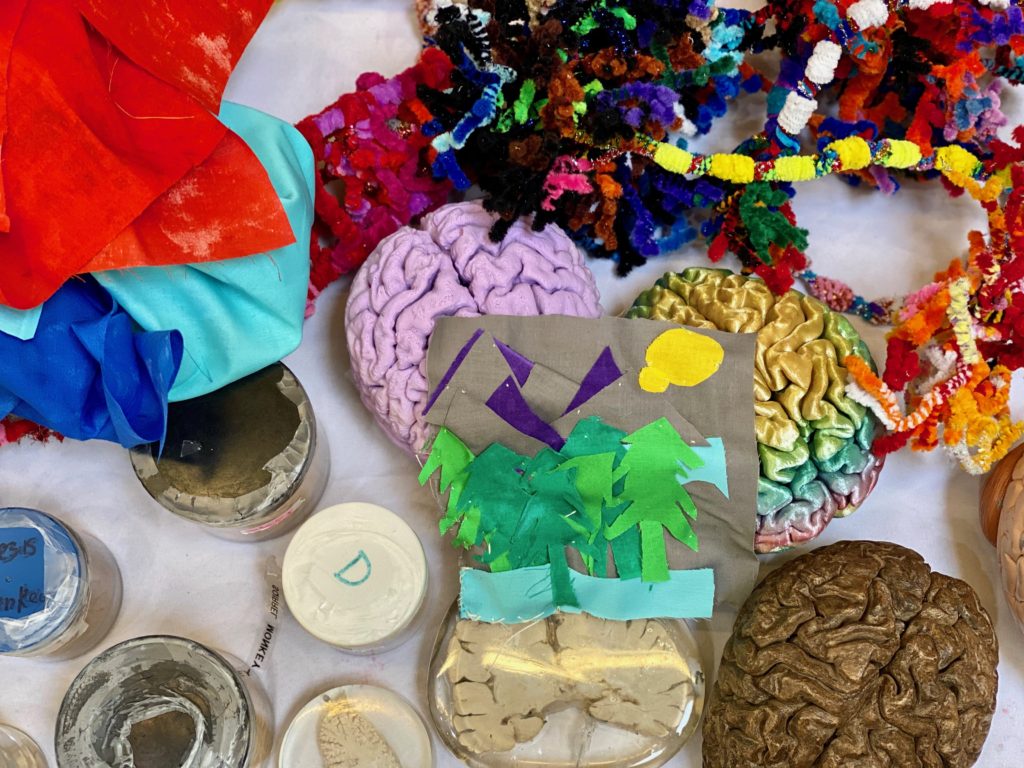
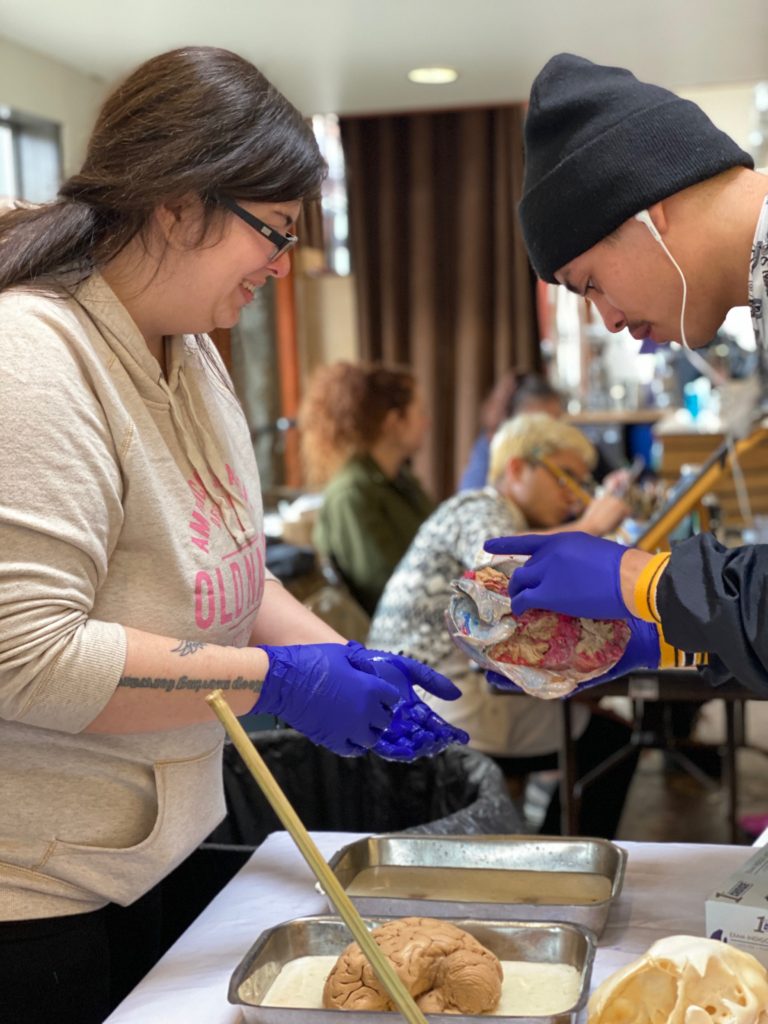
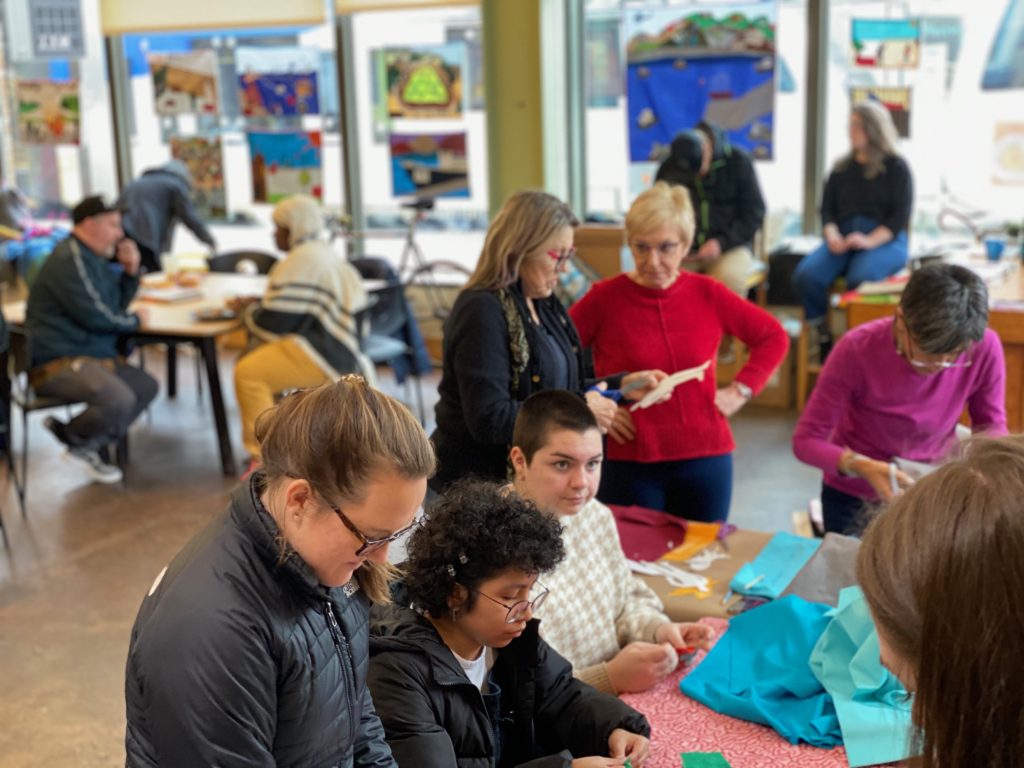
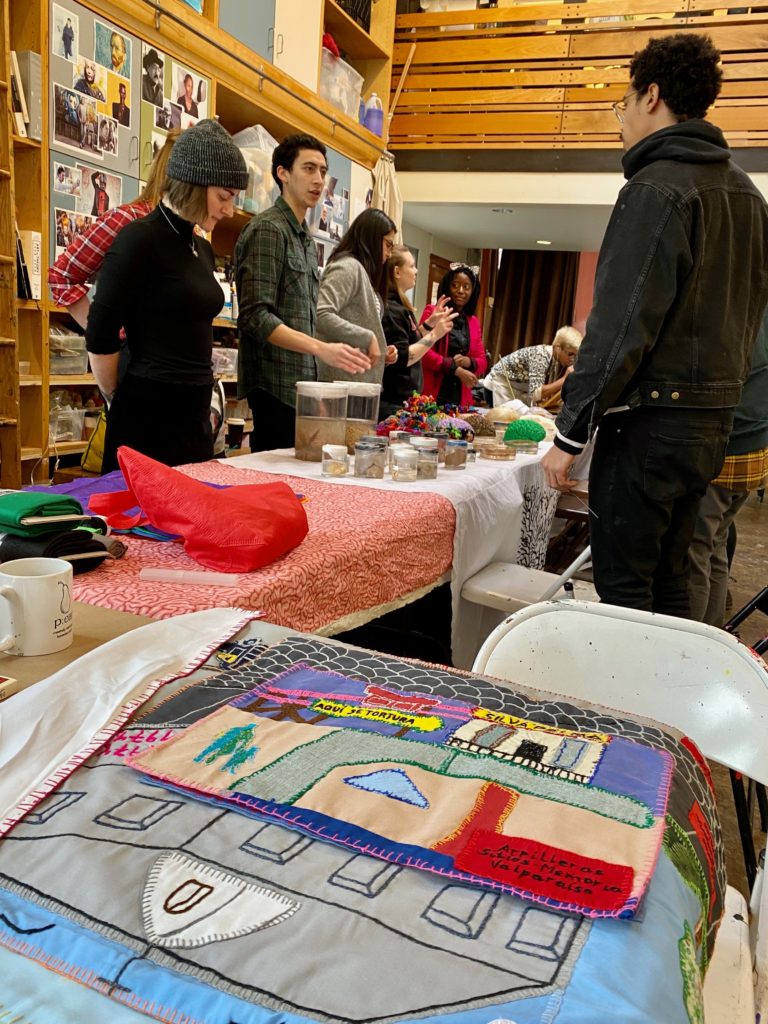
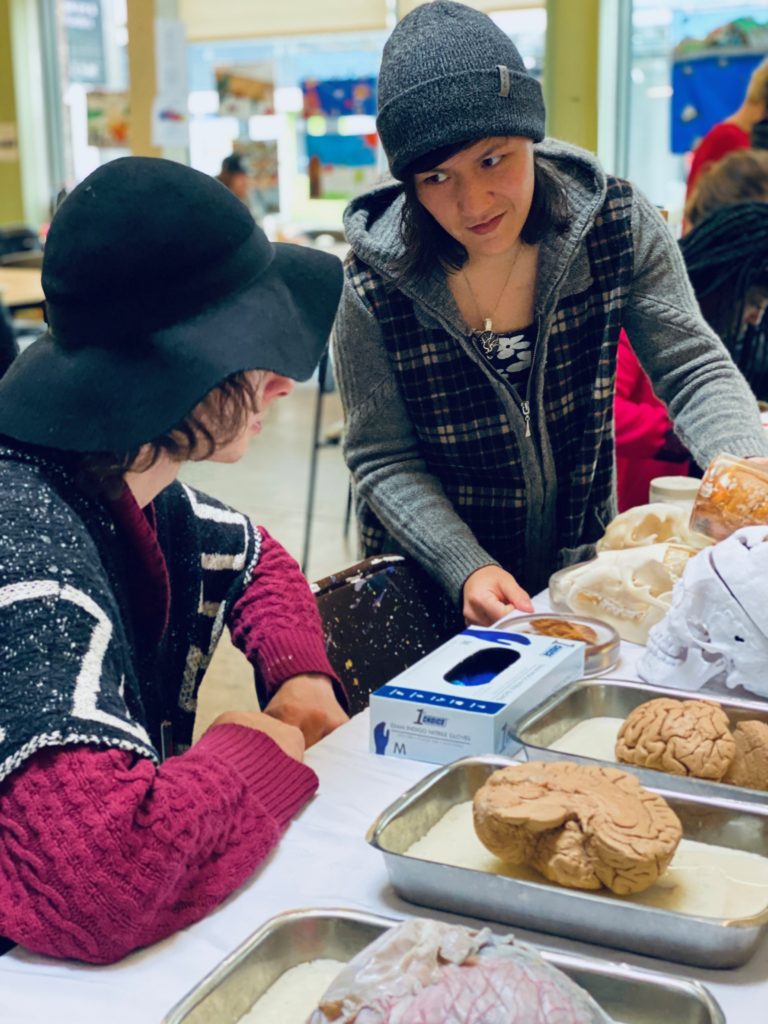
Youth asked questions about brains, and art, and history – and cut felt and fabric representations of themselves to contribute to an evolving arpillera depicting the front door of p:ear, and their valued inclusion in this community.
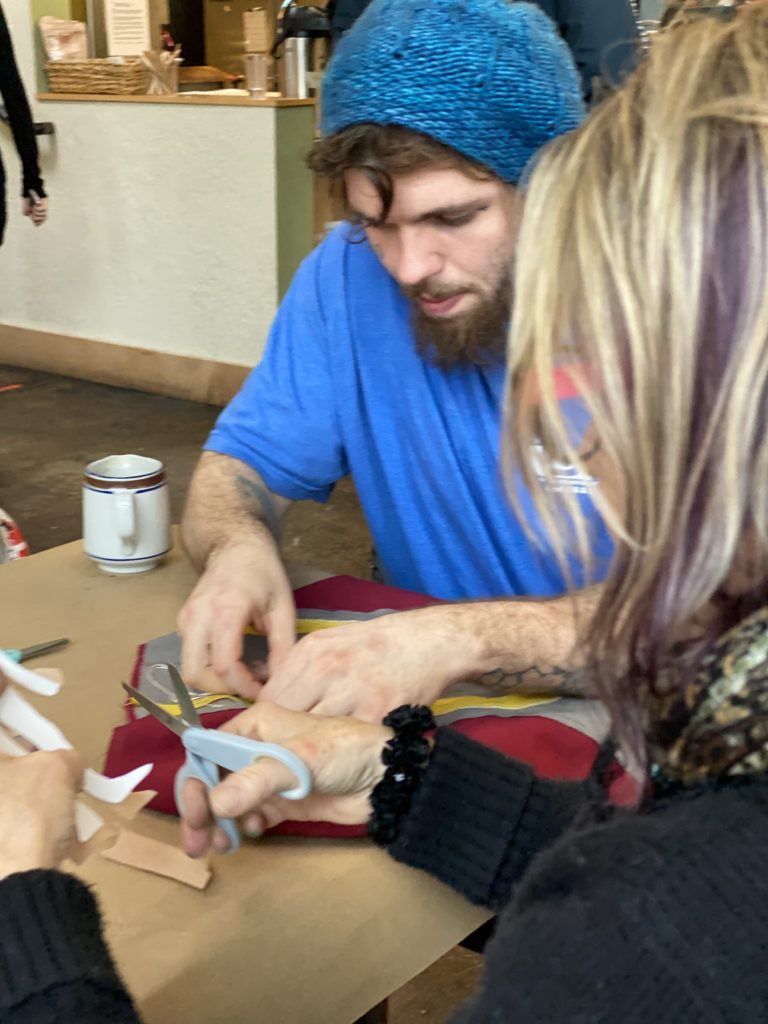
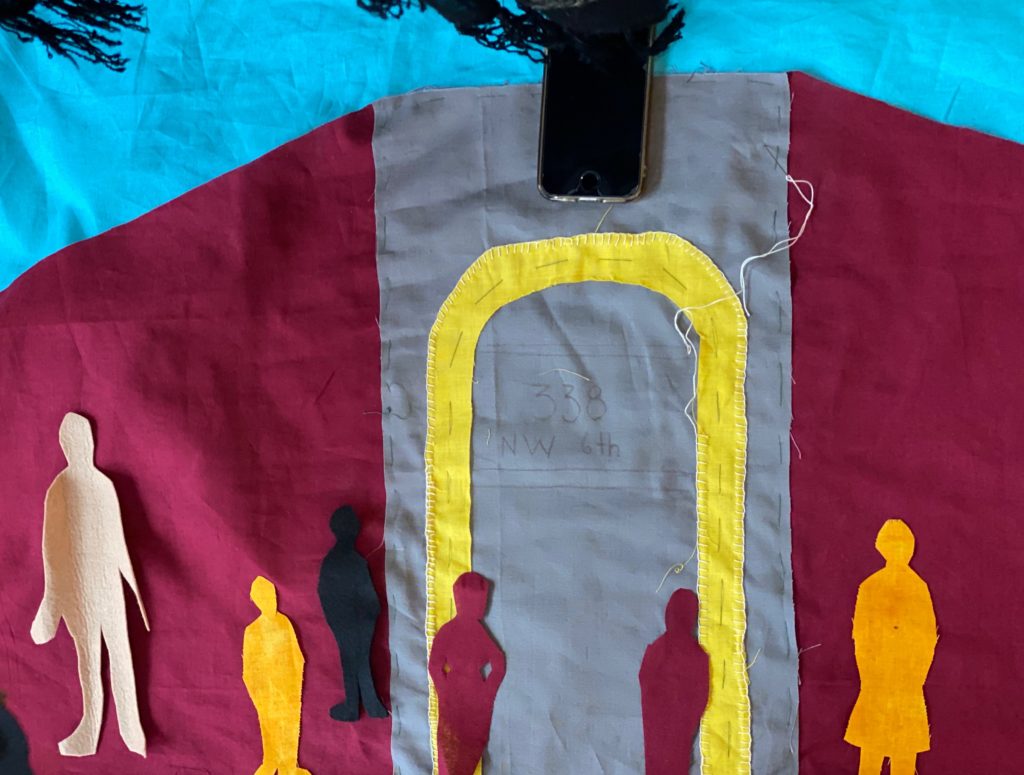
It’s a work in progress! As were additional arpilleras underway at p:ear…
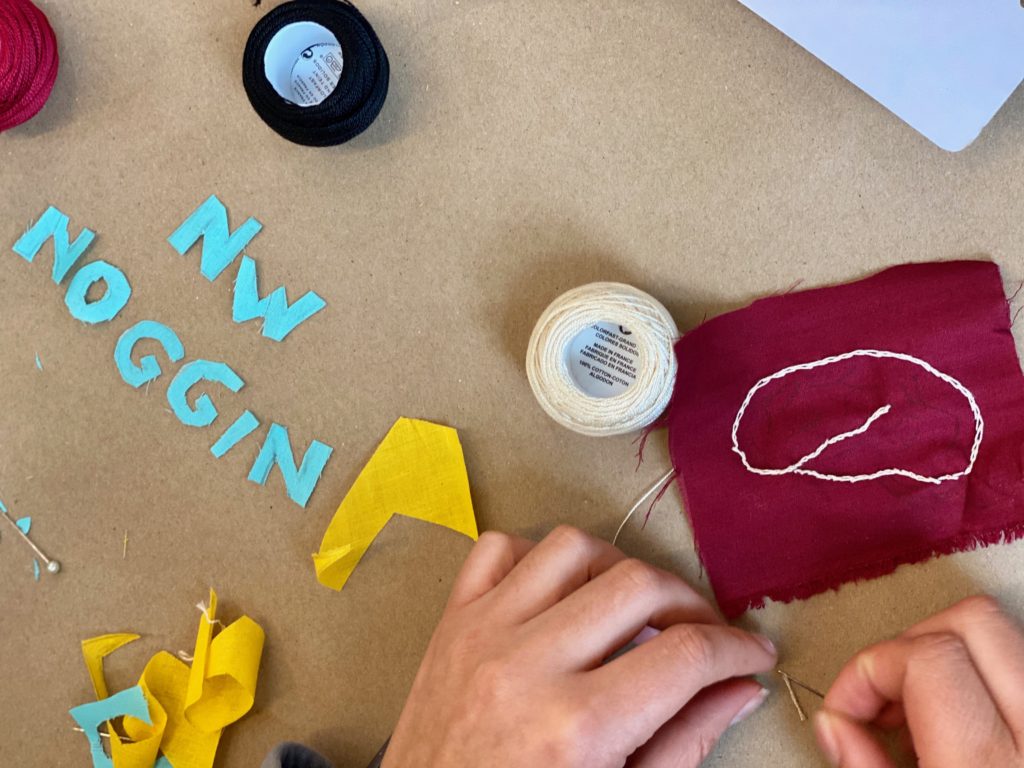
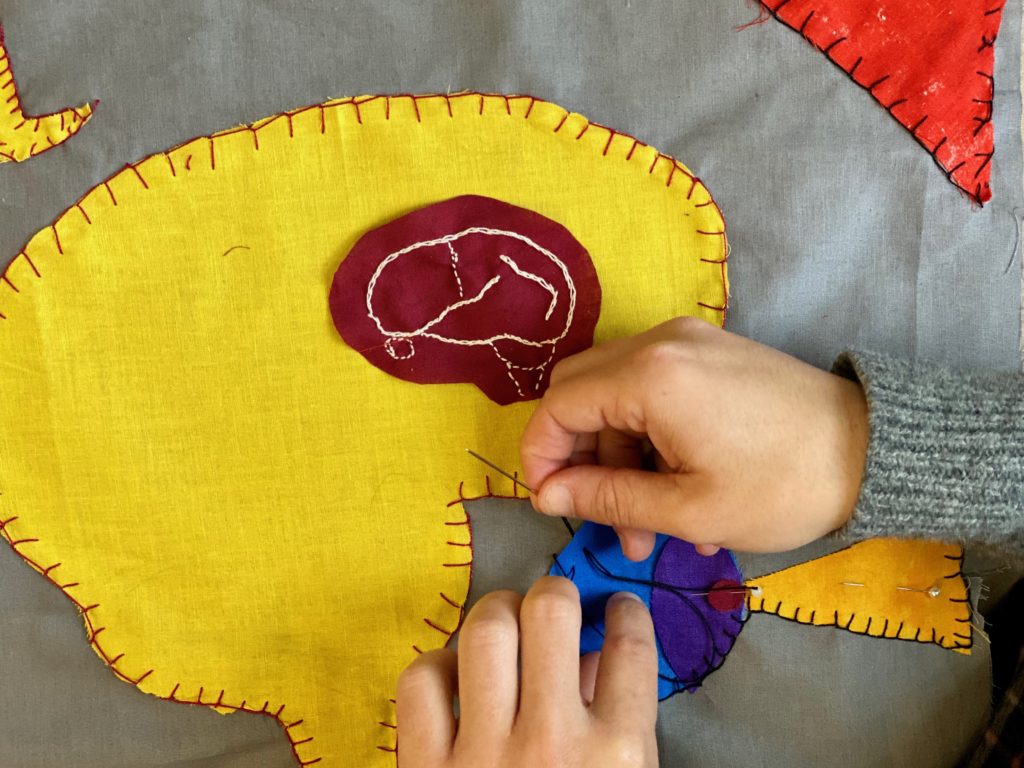
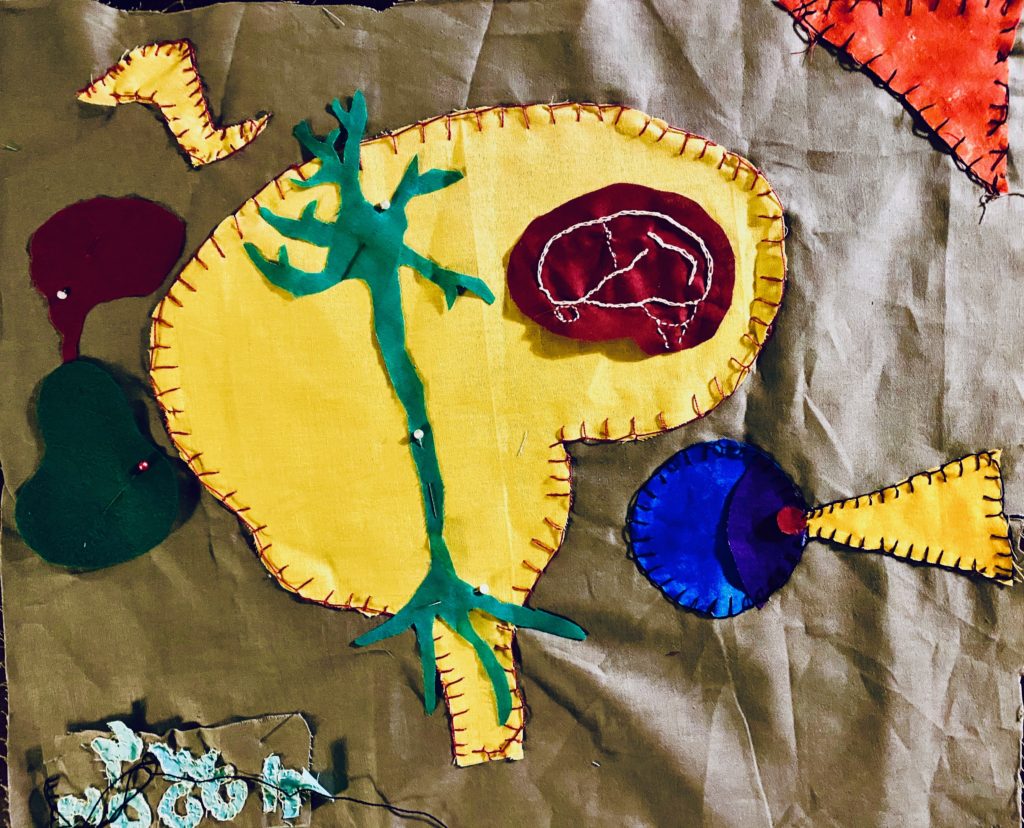
“I just loved and enjoyed contributing with a ‘sand grain’ to the wonderful project at p:ear. I wished I could have spend more time with people to finish the project but anyway I think they got the idea. I feel very thankful that Will, you and all the people let me share our experience of resilience with you, experience that could be also so useful with young people at p:ear. Gracias!”
― Cecilia Araneda
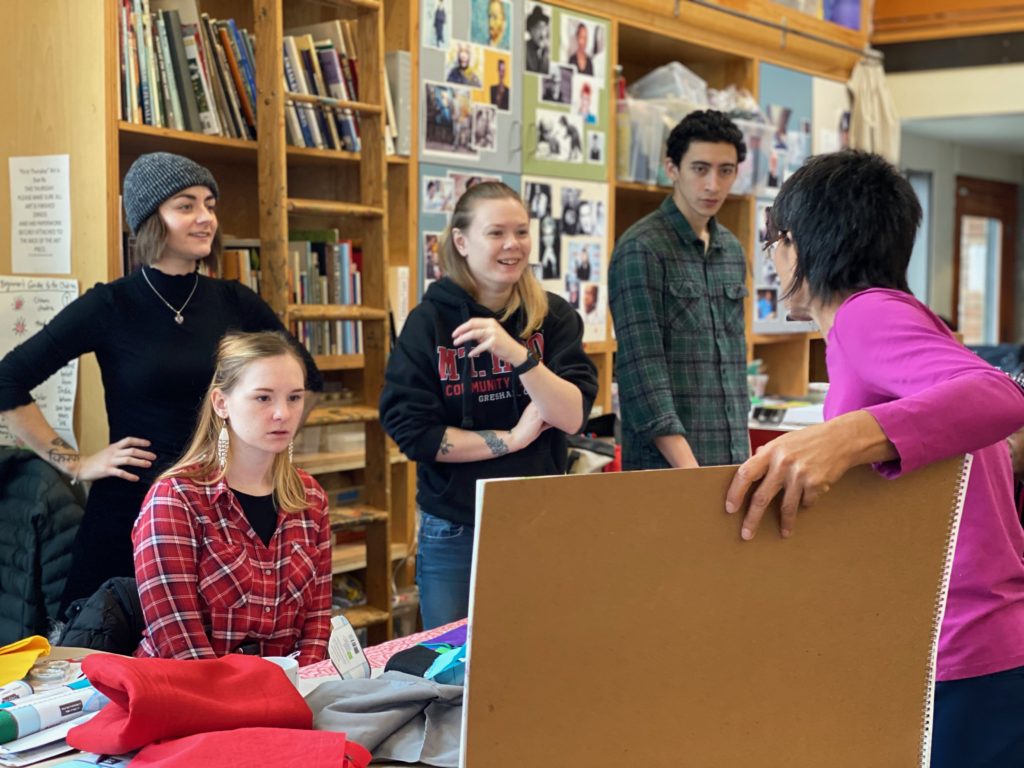
“Also feel very thankful to the experience in Astoria. Amazing that so many people are interested in all the brain-related information that Noggin presented. Also showing so much interest in the work of arpilleras and the stories behind them. Very motivating to go on in this road.”
― Cecilia Araneda
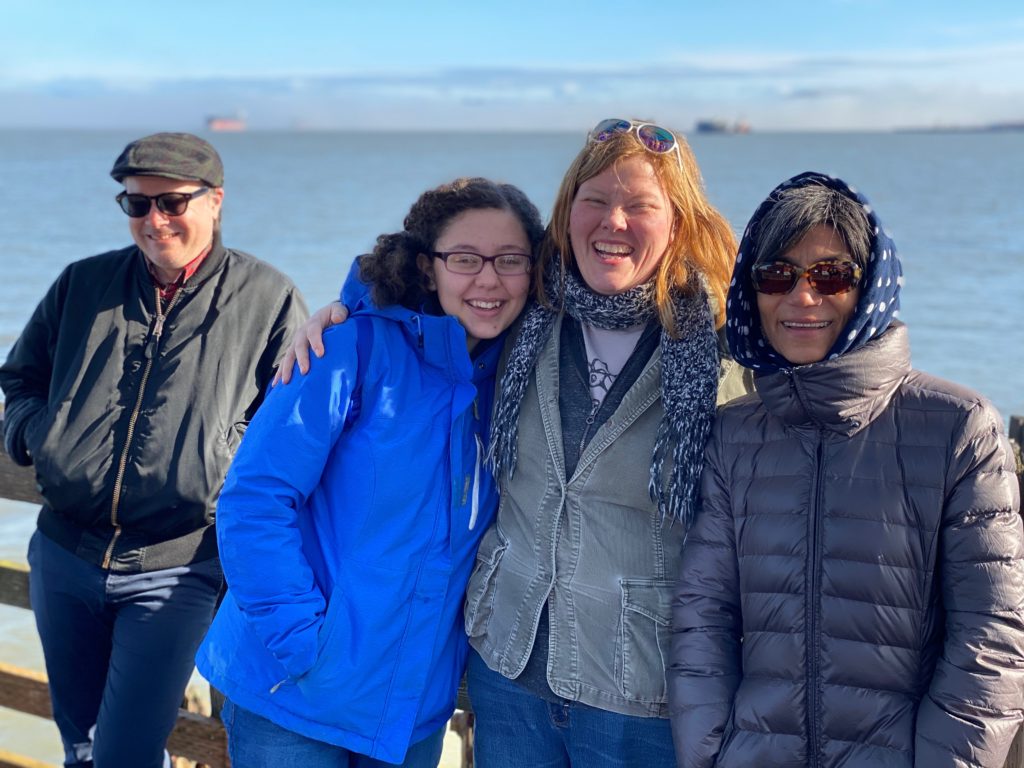
Our sincere thanks to Cecilia Araneda and the Colectivo Memorarte for sharing these important arpilleras, and inspiring us to challenge inequality and connect with our communities through stories, memory, research, action and art. And thank you KMUN, Street 14 & p:ear!
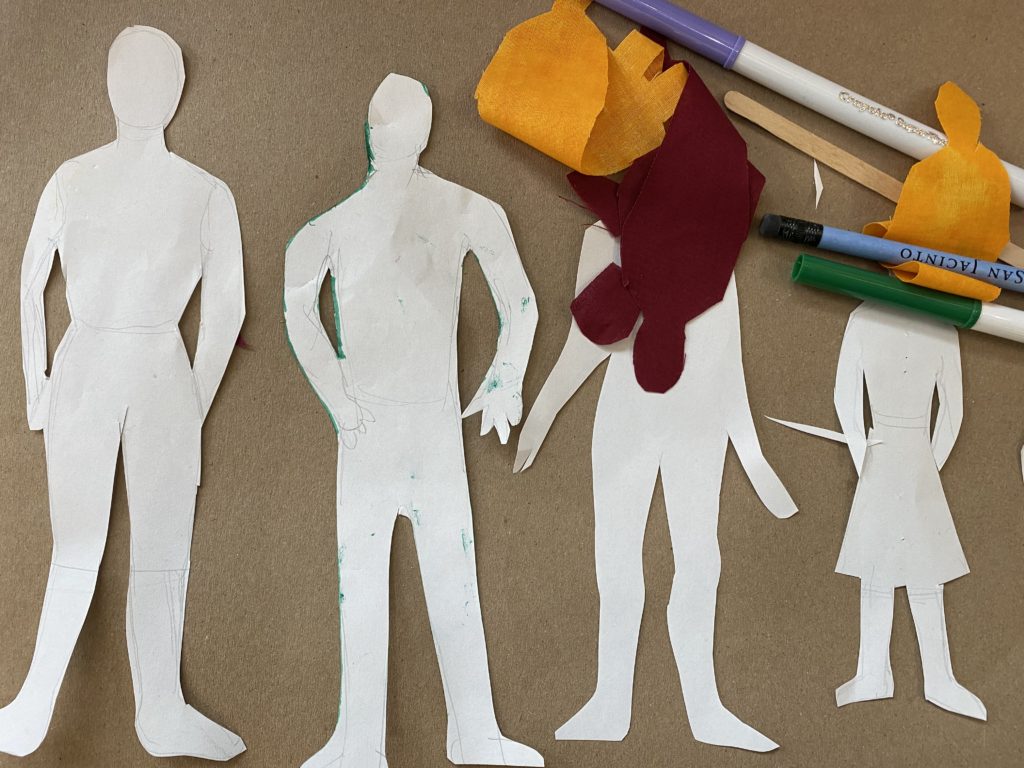
Colectivo Memorarte
FROM CECILIA: The experience of the Colectivo Memorarte “Arpilleras, sites and memory Valparaíso”, was born in 2016 as a collective initiative to recreate local memory around human rights violations that occurred, massively, during the civic-military dictatorship that started in Chile on September 11th, 1973. We express our work through the realization of the art of the arpilleras where we sew parts of the memory of our country with pieces of colored fabrics and threads.
Initially, the Colectivo started to work in the space of the Valparaíso Ex-prison Cultural Park, however, during 2017, we moved our operation –weekly- to the PRAIS (Integral Health Care and Repair Program), Valparaíso. From this place we have been able to strengthen our creative performance by affirming our identity as a cultural group that works to recover the memory of those sites that were used by the civic-military dictatorship to violate human rights.
As of 2018, we have projected our development around the realization of visits to memory and human rights sites, meetings and talks about memory and also exhibitions of our works in addition to continuing the creation of arpilleras, now even portraying actual events. With this work, we fulfill the purposes of: sharing what has been done, exchanging experiences of action around “popular memory”, and contributing to the imperative of developing a “pedagogy of memory and human rights” in our country. Our commitment is to go on working against oblivion, impunity and injustice in Chile.
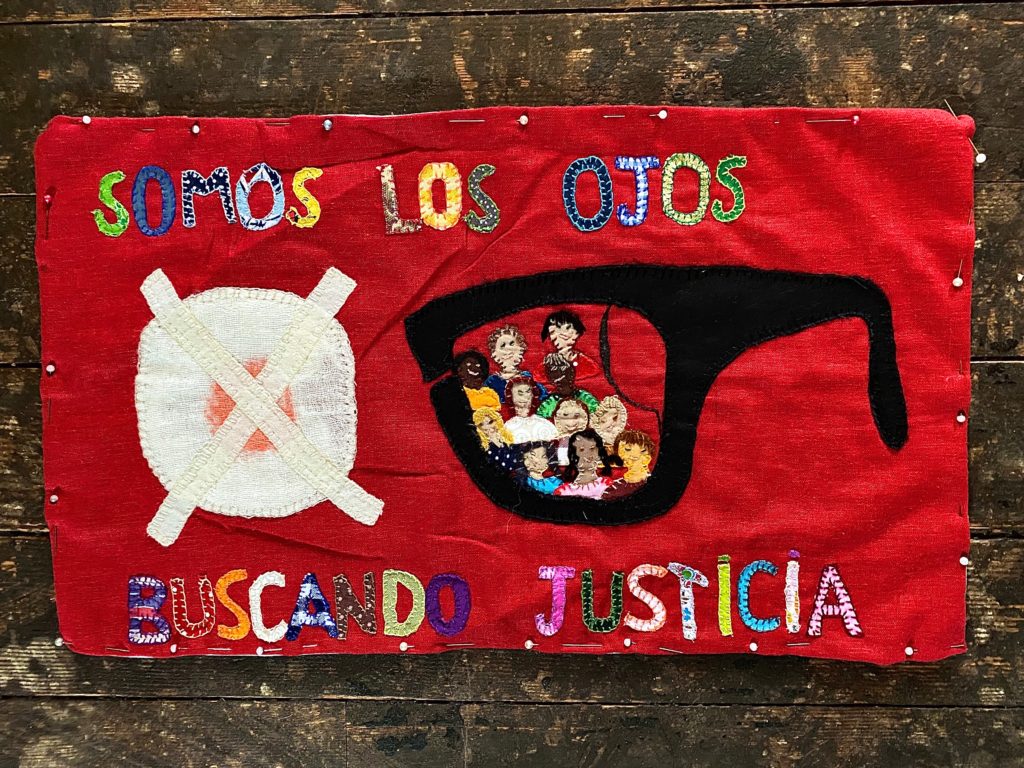
Founding members: María Alicia Salinas (our teacher and former political prisoner), Silvia Mazzella (former political prisoner), Alicia Olea (former political prisoner), Dana Wordes, Valeria Arancibia, Gabriela Palleras, Marisa Chávez. In the course of the years some members have joined and others, for reasons of work or place of residence, have not been able to participate. Today, our teacher, originally from Santiago, no longer travels to all sessions for health reasons. The actual nine members are: Silvia Mazzella, Alicia Olea, Dana Wordes, Valeria Arancibia, Gabriela Palleras, Nora Torres, Jacqueline van Rysseghem, Marisa Chávez and me, Cecilia Araneda. We have participated in various human rights events, universities, hospitals, cultural centers, openings of memory sites and cultural exhibitions.
So, we invite you to explore our recent history through these arpilleras where you could imagine the pain and despair as well as the courage and hope of men and women who believed and fought for a better world.
LEARN MORE: INDICE CATALOGO ACTUALIZADO
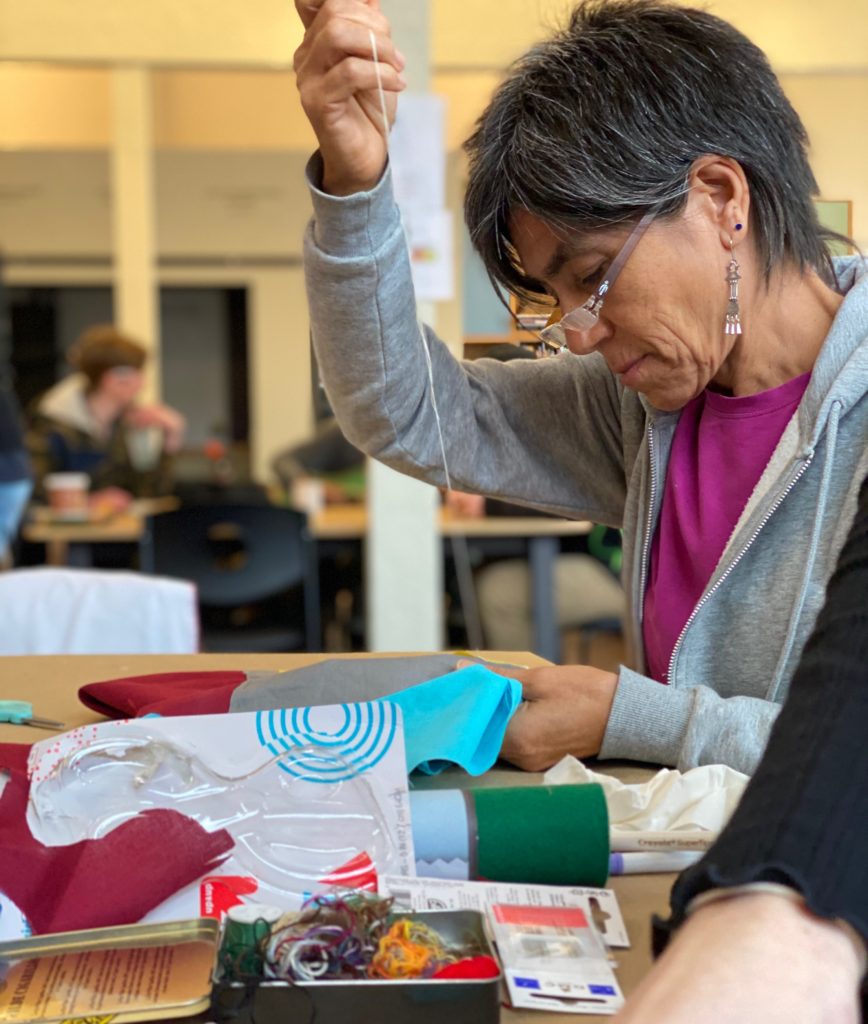
More on the arpillera project (Cecilia Araneda)
DISCOVER: Arpillera Project Cecilia Araneda
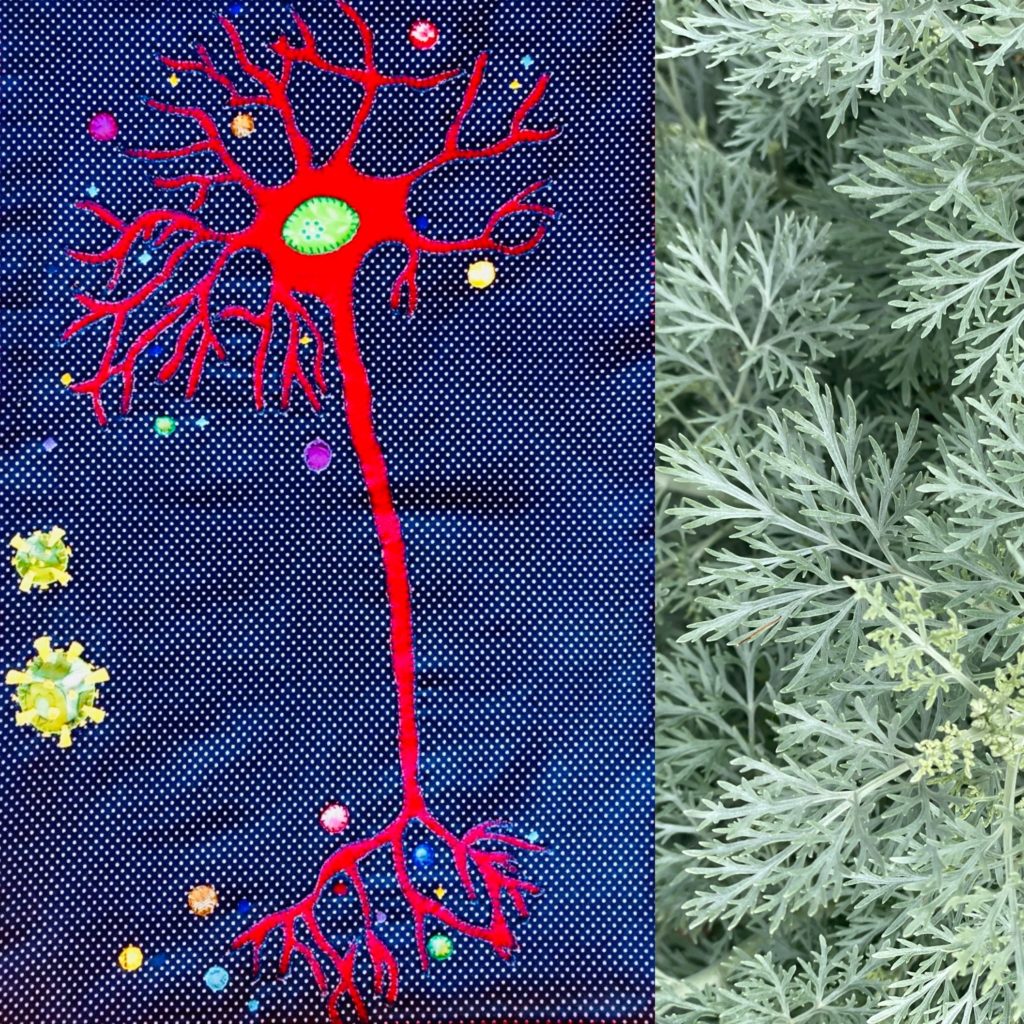
“#Neurona en tiempos de #coronavirus”
#brain inspired #arpillera by #artist Cecilia Araneda
#showusyourbraincell


